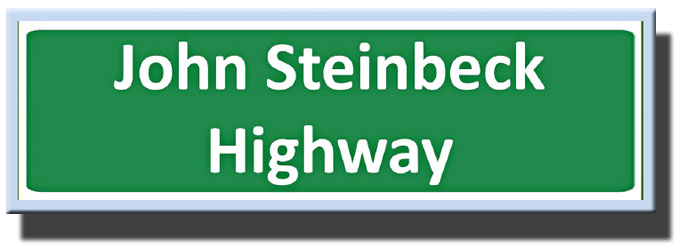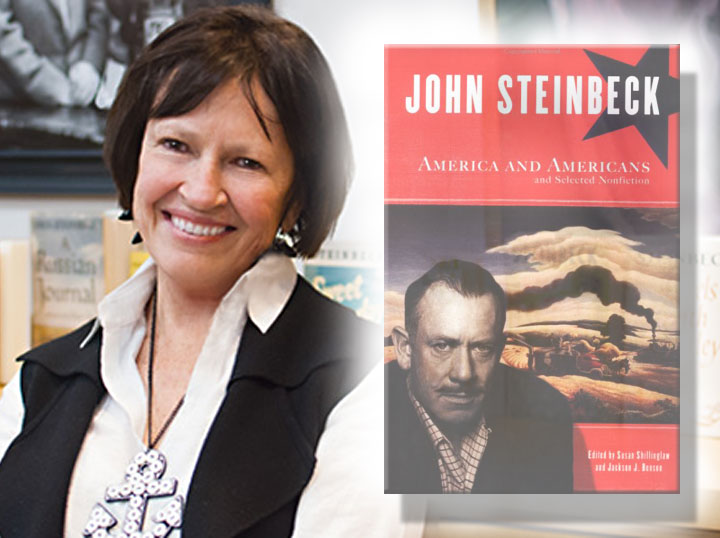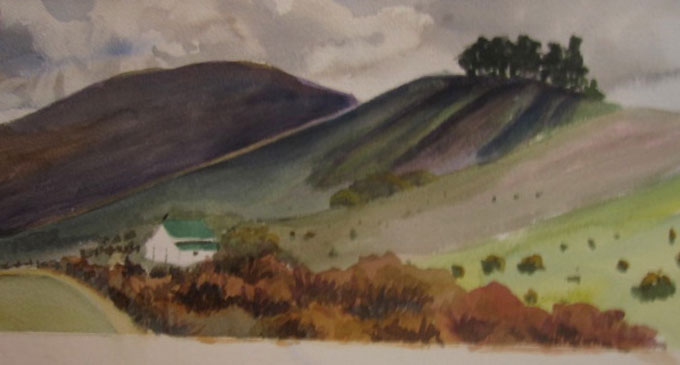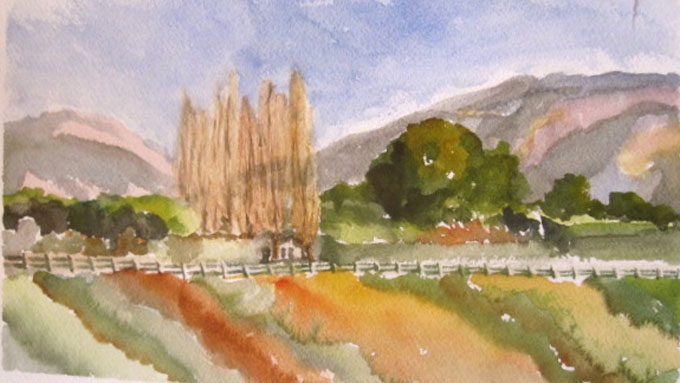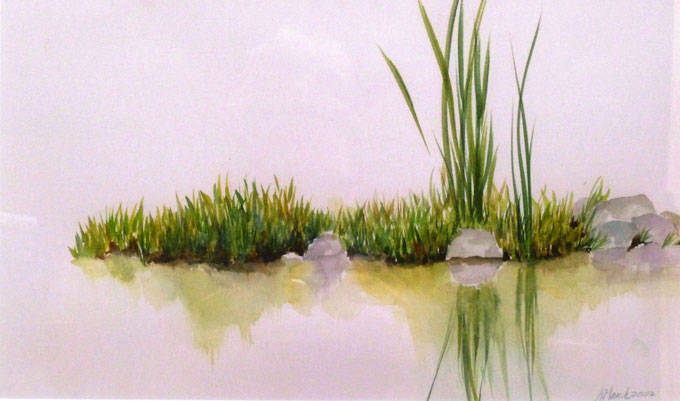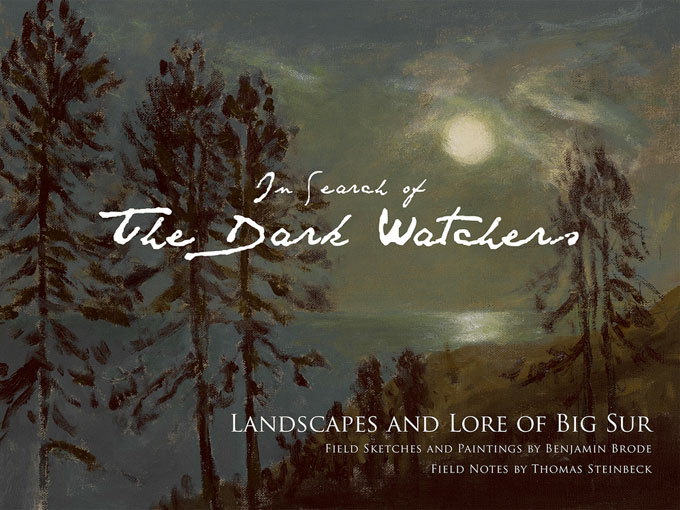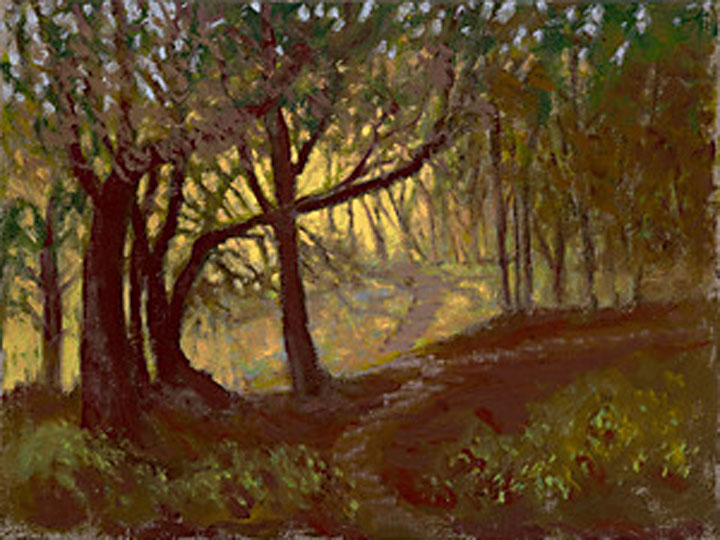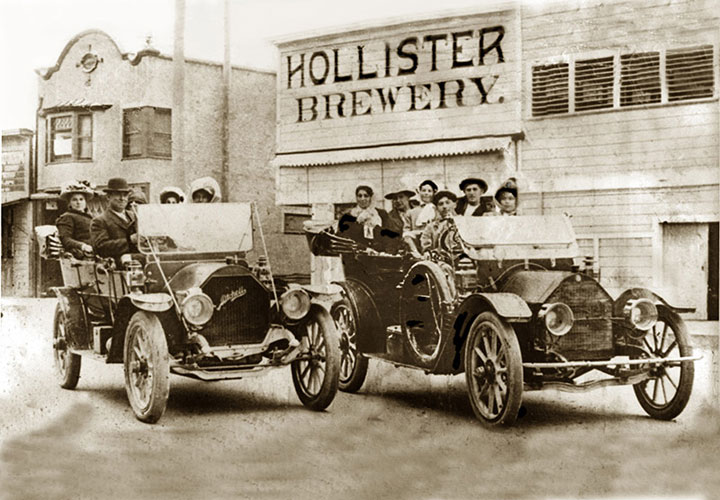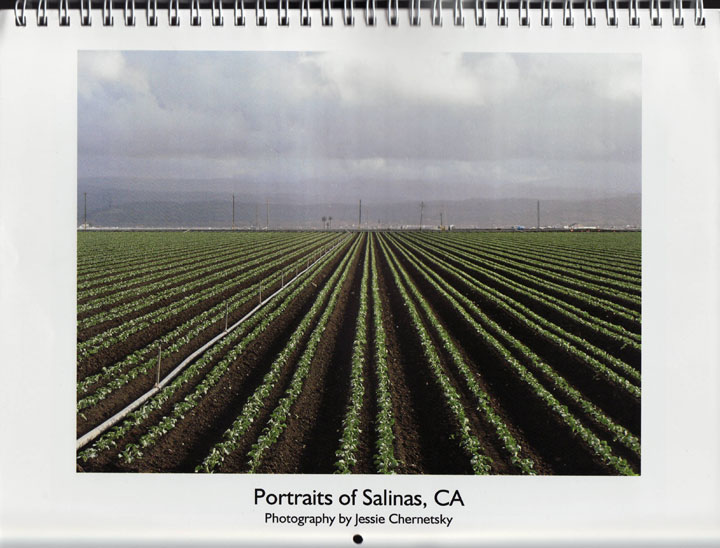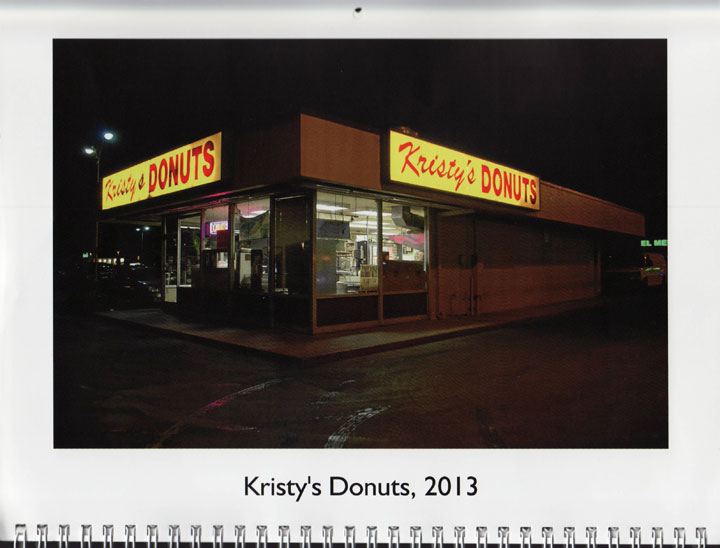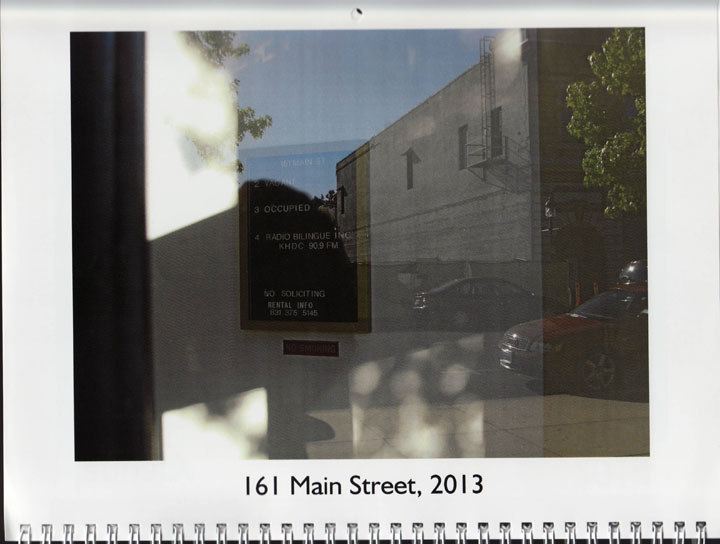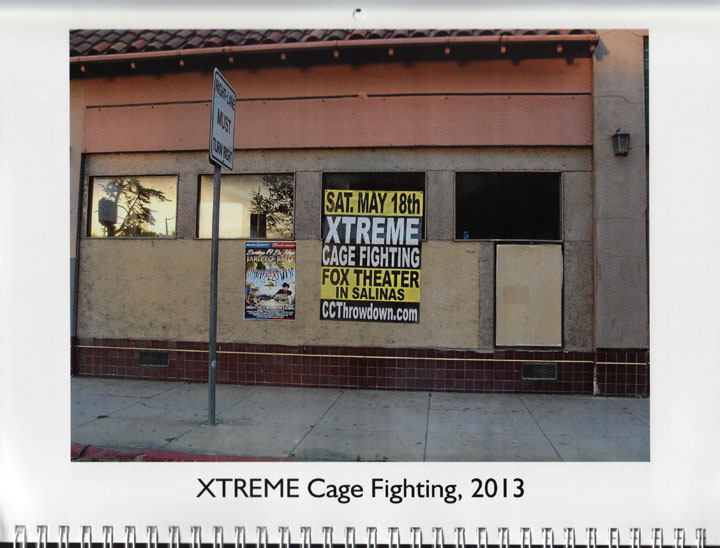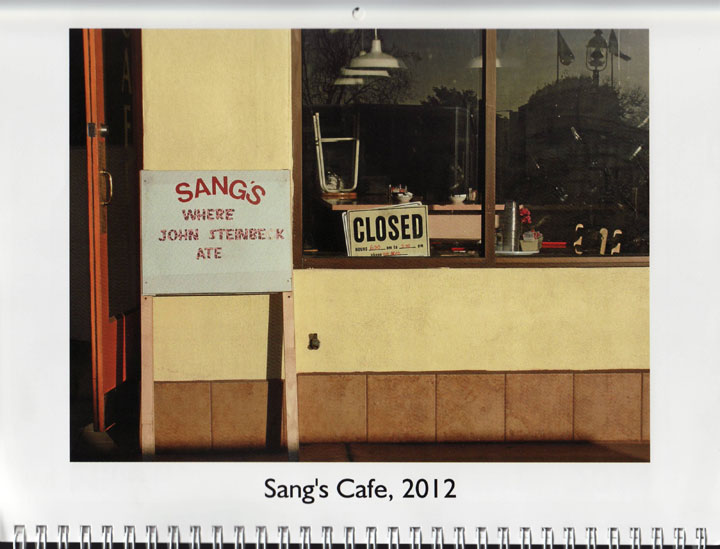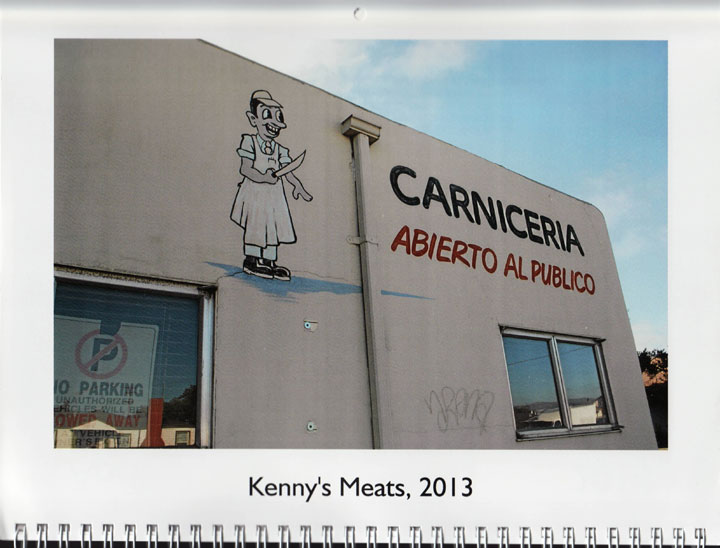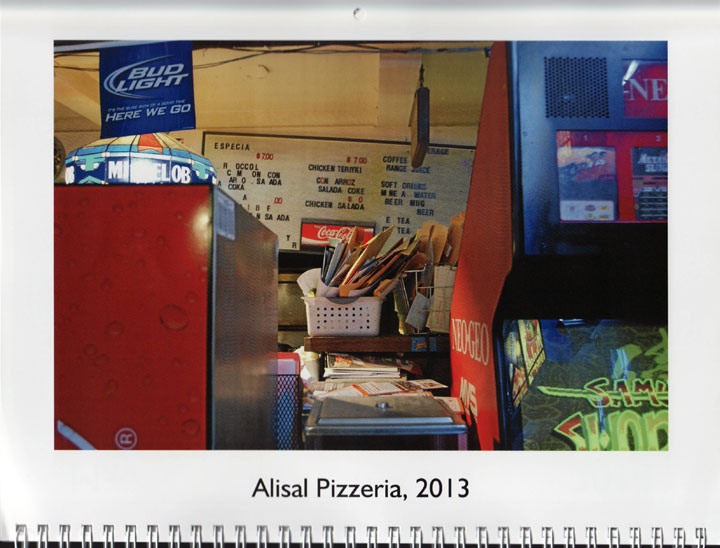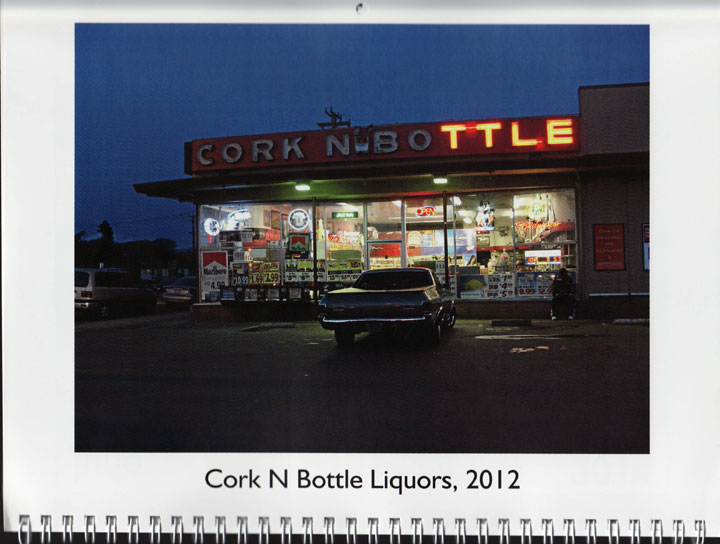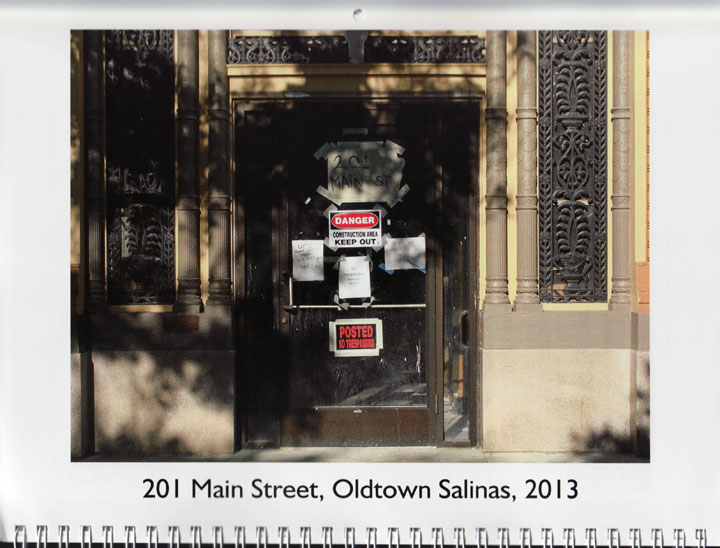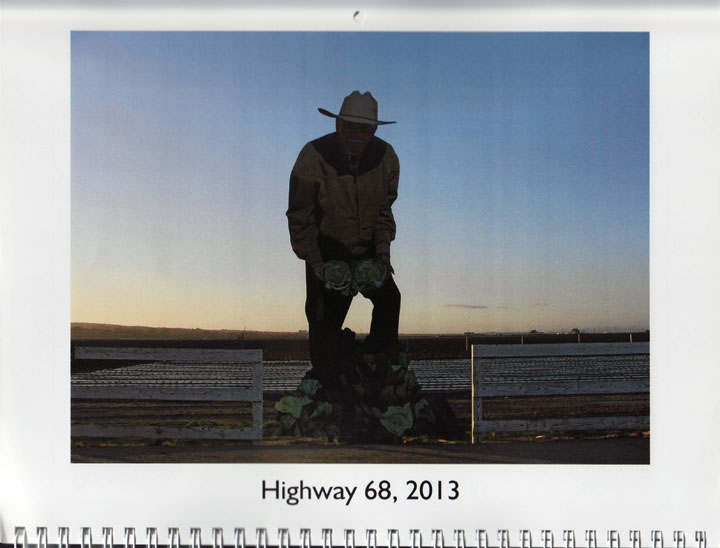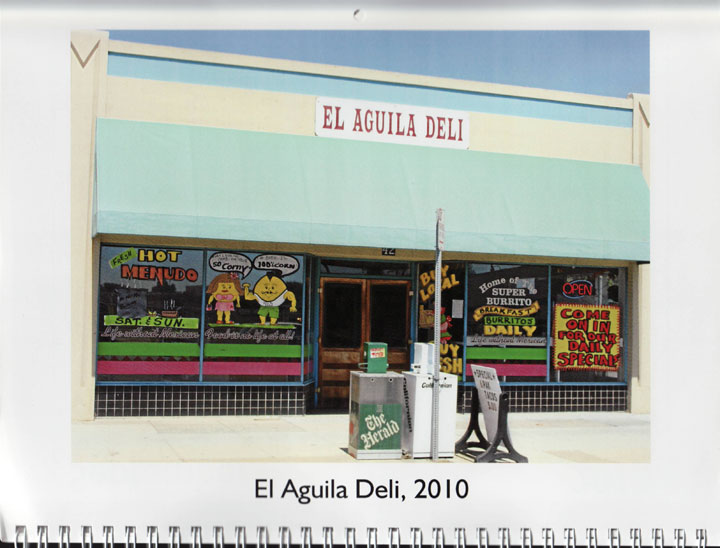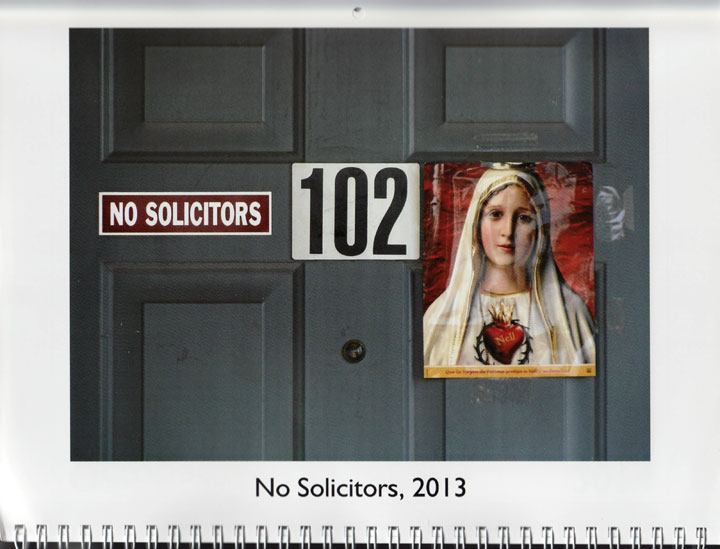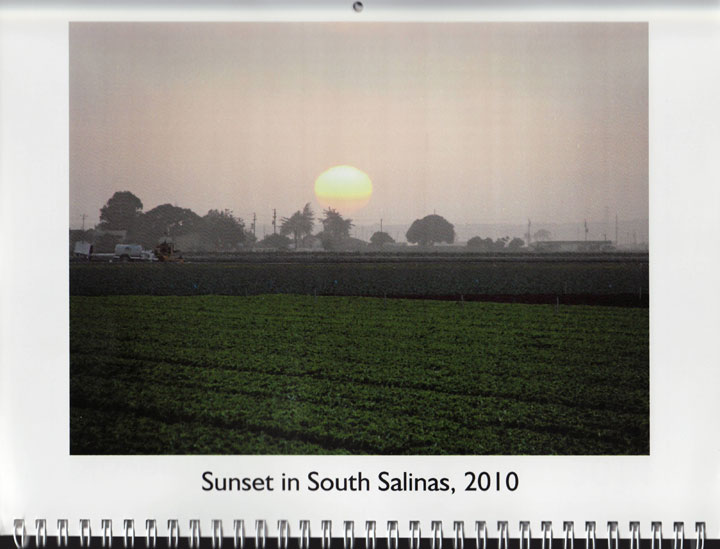John Steinbeck liked to travel and learned to drive while growing up in Salinas, California, where a stretch of nearby Highway 101 was officially named for the author of Travels with Charley at an October 26 ceremony in Steinbeck’s hometown. Legislation naming the John Steinbeck Highway portion of Highway 101—from the Espinosa Road/Russell Road undercrossing to John Street in downtown Salinas—passed the California State Assembly last year as part of a bill designating other sections of Highway 101, including Gateway to the Pinnacles Highway. Appropriately, the John Steinbeck Highway sign was unveiled at the National Steinbeck Center, located on the historic Salinas, California main street accessed from Highway 101 at the “National Steinbeck Center” exit familiar to visitors since the building opened two decades ago. Said Steinbeck scholar Susan Shillinglaw, director of the busy Salinas, California center, “John Steinbeck loved cars” and owned a Packard, a Jaguar, a Buick, even a rare European car. “In nearly all of his books, cars roll along highways—including two of his best road books: Travels with Charley and The Grapes of Wrath.”
Salinas, California Stretch of Highway 101 Named for John Steinbeck Earlier This Week
“This Old House” Means Conservation—and Care for Art and Ecology—in John Steinbeck’s Pacific Grove
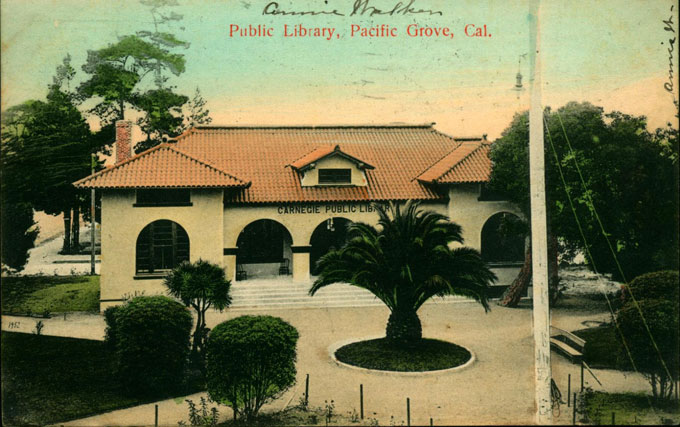
Pacific Grove, California—John Steinbeck’s retreat when there was writing or healing to be done—is a preservation-minded community where “this old house” means the whole town, and residents like Nancy and Steve Hauk, celebrity-citizens with ties to Steinbeck, contribute to the present while connecting with the past. Founded in 1875 as a seaside getaway for camp-meeting Methodists, one where liquor was outlawed and modesty was mandated, Pacific Grove soon became a summer destination—Chautauqua West—for vacationing non-Methodists from inland towns such as Salinas.
Founded in 1875 as a seaside getaway for camp-meeting Methodists, one where liquor was outlawed and modesty was mandated, Pacific Grove soon became a summer destination—Chautauqua West—for vacationing non-Methodists from inland towns such as Salinas.
Steinbeck’s parents liked Pacific Grove’s culture and cool air; their modest weekend cottage off Central Avenue on 11th Street had a view of the bay when Steinbeck was a boy. In 1906 Pacific Grove got a grant to build a Carnegie library on Central, within walking distance of the Steinbeck cottage, where Steinbeck’s wife Carol Henning is thought to have worked in the early 1930s. Steinbeck’s friend Ed Ricketts lived in a handsome house up the hill from Central Avenue on Lighthouse, the other major thoroughfare—until Ed’s wife left him and he moved to lab space he rented for his struggling marine specimen business between Lighthouse and Central avenues. Now located on busy Cannery Row, where peaceful Pacific Grove meets fun-loving Monterey, “Doc’s Lab” attracted legendary people and parties in the 1930s and 40s, achieving the stature of myth in John Steinbeck’s Cannery Row fiction.
Nancy Hauk, an artist, and Steve Hauk, a writer, own the Ricketts home today. Together they operate Hauk Fine Arts, an intimate art gallery less than a block from Holman’s Department Store, another Pacific Grove landmark made famous by Steinbeck’s fiction. A playwright, Steve recently completed “Almost True Stories from a Writer’s Life,” a series of short stories based on relationships and events from Steinbeck’s life in Pacific Grove, Monterey, and Salinas. One story, “The Daughter,” is set in the Ricketts house. Another features Bruce and Jean Ariss, artists who lived in Pacific Grove during Steinbeck’s time and moved in the colorful Ricketts-Steinbeck circle. Steve is an expert on California artists, and the gallery features paintings by friends of Steinbeck, including Bruce Ariss, inspired by the life and landscape of Pacific Grove, Carmel, and Monterey Bay. Visitors to Hauk Fine Arts who are willing to take up the time freely given by Steve, a former reporter for the Monterey Herald, get an instant education in Steinbeck, Pacific Grove, and the town’s this-old-house history.
Pacific Grove Library Honors Hauks with an Art Gallery
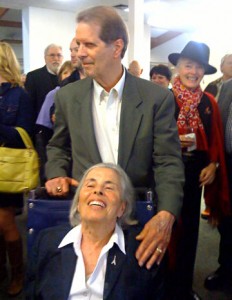 The Hauks love Pacific Grove, and Pacific Grove loves them in return. Earlier this year officials announced that new gallery space in the Pacific Grove Public Library would be named in honor of the couple, a tribute to Nancy’s art and Steve’s devotion to his wife, who suffers from a progressive neurological disease. Friends of the Library, a volunteer group that gets things done, raised funds to build out the space, part of a long-term program to upgrade and restore the aging Carnegie library to its former glory. Located a stone’s throw from the sea in a neighborhood of immaculate Victorian homes and historic public buildings including Chautauqua Hall, the library was and is a gathering place for Pacific Grove, where culture continues to attract visitors like butterflies. An art exhibit and lecture series celebrating Rachel Carson’s 1955 book about coastal ecology, The Edge of the Sea, will feature the Carson and Steinbeck biographer William Souder on December 4.
The Hauks love Pacific Grove, and Pacific Grove loves them in return. Earlier this year officials announced that new gallery space in the Pacific Grove Public Library would be named in honor of the couple, a tribute to Nancy’s art and Steve’s devotion to his wife, who suffers from a progressive neurological disease. Friends of the Library, a volunteer group that gets things done, raised funds to build out the space, part of a long-term program to upgrade and restore the aging Carnegie library to its former glory. Located a stone’s throw from the sea in a neighborhood of immaculate Victorian homes and historic public buildings including Chautauqua Hall, the library was and is a gathering place for Pacific Grove, where culture continues to attract visitors like butterflies. An art exhibit and lecture series celebrating Rachel Carson’s 1955 book about coastal ecology, The Edge of the Sea, will feature the Carson and Steinbeck biographer William Souder on December 4.
Located a stone’s throw from the sea in a neighborhood of immaculate Victorian homes and historic public buildings including Chautauqua Hall, the library was and is a gathering place for Pacific Grove, where culture continues to attract visitors like butterflies.
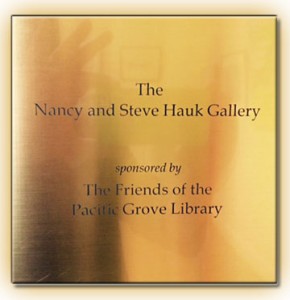 The Nancy and Steve Hauk Gallery formally opened at a Friends of the Library reception—attended by fellow artists and community members, and the Hauks’ younger daughter Anne—on October 2, 2015. The library’s Rachel Carson exhibit opened the same day, a meaningful coincidence on many levels. The Methodists who founded Pacific Grove may have been teetotalers, but they were thirsty for knowledge and curious about ideas, art, and science, subjects that defined the summer Chautauqua circuit with its West Coast center in Pacific Grove more than a century ago.
The Nancy and Steve Hauk Gallery formally opened at a Friends of the Library reception—attended by fellow artists and community members, and the Hauks’ younger daughter Anne—on October 2, 2015. The library’s Rachel Carson exhibit opened the same day, a meaningful coincidence on many levels. The Methodists who founded Pacific Grove may have been teetotalers, but they were thirsty for knowledge and curious about ideas, art, and science, subjects that defined the summer Chautauqua circuit with its West Coast center in Pacific Grove more than a century ago.
The Methodists who founded Pacific Grove may have been teetotalers, but they were thirsty for knowledge and curious about ideas, art, and science, subjects that defined the summer Chautauqua circuit with its West Coast center in Pacific Grove more than a century ago.
Like Ed Ricketts, Rachel Carson was a scientist; like Ricketts and Steinbeck, she thought deeply and wrote prophetically about ecology. The Sea Around Us (1950), The Edge of the Sea, and Silent Spring (1962), popular books that have become classics, equal Steinbeck in style and Ricketts in observation. Nancy Hauk paints with similar grace and perception about similar subjects—seabirds on the sand, water reeds reflected in a tide pool, the gentle golden hills described by Steinbeck in his best writing about California. Like Steinbeck, Nancy rarely repeats herself in her work, and Steve is still finding sketches and paintings—some completed, others left unfinished—in their house on Lighthouse Avenue.
A Piece of This-Old-House from Steinbeck’s Pacific Grove
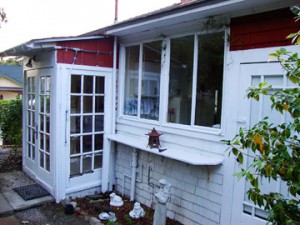 Nancy and Steve are walkers in a walking town. Since Nancy’s move to memory care at Cottages of Carmel, where she often can be found with caregiver and friend Yolanda Campos, Steve’s been doing more driving than walking, daily making the drive to visit Nancy over Carmel Hill, a trip Mac and the Boys made to hunt frogs in Cannery Row. One day recently he walked by the Steinbeck family cottage off Central Avenue in Pacific Grove and noticed a dumpster loaded with wood that had been removed for replacement in the process of retrofitting the cottage. “This old house,” he said, “witnessed so much history, and writing. I salvaged three pieces of redwood siding from the dumpster, just in case. I’m glad I did. When I drove by the next day the dumpster was gone.” Thanks to Steve’s care for John Steinbeck, Pacific Grove, and posterity, a piece of the famous cottage has joined the collection of Steinbeck memorabilia at the Martha Heasley Cox Center for Steinbeck Studies, one that includes Steinbeck’s typewriter and the manuscripts of books the author wrote while living—and healing—in the place he loved.
Nancy and Steve are walkers in a walking town. Since Nancy’s move to memory care at Cottages of Carmel, where she often can be found with caregiver and friend Yolanda Campos, Steve’s been doing more driving than walking, daily making the drive to visit Nancy over Carmel Hill, a trip Mac and the Boys made to hunt frogs in Cannery Row. One day recently he walked by the Steinbeck family cottage off Central Avenue in Pacific Grove and noticed a dumpster loaded with wood that had been removed for replacement in the process of retrofitting the cottage. “This old house,” he said, “witnessed so much history, and writing. I salvaged three pieces of redwood siding from the dumpster, just in case. I’m glad I did. When I drove by the next day the dumpster was gone.” Thanks to Steve’s care for John Steinbeck, Pacific Grove, and posterity, a piece of the famous cottage has joined the collection of Steinbeck memorabilia at the Martha Heasley Cox Center for Steinbeck Studies, one that includes Steinbeck’s typewriter and the manuscripts of books the author wrote while living—and healing—in the place he loved.
Photo of Ricketts-Hauk home in Pacific Grove courtesy David Laws.
Steinbeck Star Rises to the Occasion: Susan Shillinglaw Named Interim Director of National Steinbeck Center
Susan Shillinglaw has a PhD from UNC-Chapel Hill, a bibliography as long as your arm, and star status as an internationally celebrated professor of English at San Jose State University, where she teaches a course devoted to John Steinbeck and formerly served as director of San Jose State University’s Martha Heasley Cox Center for Steinbeck Studies. No disrespect intended, but years after earning her UNC-Chapel Hill degree she looks more like a graduate student than a “senior scholar,” living proof that people who love their work really do keep their youth.
No disrespect intended, but years after earning her UNC-Chapel Hill degree Susan looks more like a graduate student than a ‘senior scholar.’
Watching Susan in action, you wonder when she sleeps—organizing conferences, writing books, editing reissues of John Steinbeck works famous for the fluent style of her helpful introductions. She lives with her husband, a marine biologist, in laid-back Pacific Grove, John Steinbeck’s former home, but clocks more frequent-flyer miles on Steinbeck business than some CEOs. Her management portfolio now includes the National Steinbeck Center in Salinas, California, where she was named interim director following Colleen Bailey’s appointment as managing director of the Monterey Jazz Festival.
She lives with her husband in laid-back Pacific Grove, but clocks more frequent-flyer miles on Steinbeck business than some CEOs.
From its inception, Susan has served as an organizer, board member, and resident expert for the Salinas center, which has struggled against local odds to live up to its national name. The Monterey County Weekly reported last week on the slow pace of the lease-back deal to relieve finances by selling the center’s downtown Salinas building to San Jose State University’s sister school, California State Monterey Bay, saying of Susan that “she doesn’t like the term ‘limbo.’ It implies inactivity, and she say’s that’s not what’s happening.”
Susan has served as an organizer, board member, and resident expert for the Salinas center, which has struggled against local odds to live up to its national name.
According to the newspaper, Susan wants to increase active collaboration between the Steinbeck center at San Jose State University where she teaches and the one in Salinas, California, a distinction she understands can be confusing to outsiders, despite the physical and cultural distance between the two venues: “She wants to join the forces of the San Jose State and Salinas Steinbeck Centers next year in a synergistic partnership to share programming, attendance and advertising.”
‘She wants to join the forces of the San Jose State and Salinas Steinbeck Centers next year in a synergistic partnership to share programming, attendance and advertising.’
Speaking as a friend of Susan’s and a fellow PhD-graduate of UNC-Chapel Hill, I can’t imagine anyone better prepared by education, experience, or energy to bridge existing gaps and make John Steinbeck, her life’s work, more accessible to the public.
Fine Art by Nancy Hauk on Show in Pacific Grove, John Steinbeck’s Favorite Place
The magical landscape of John Steinbeck’s beloved Monterey, California Peninsula continues to inspire fine art with broad appeal. “Loving Watercolor, Paintings by Nancy Hauk’’—an exhibition opening on April 17 at the Pacific Grove Public Library—is an impressive example. “Near Harmony” (above) was painted just off Highway 1 on the Central California coast. John Steinbeck worked on the highway construction crew as a young man before becoming the state’s most famous writer.
John Steinbeck’s Pacific Grove
Steinbeck did much of his early writing in Pacific Grove, the quaint, colorful town south of Monterey, California, where Cannery Row starts and a slender street running past the Steinbeck family cottage bears the name of Ed Ricketts, the marine biologist and model for Jim Casy and other characters in John Steinbeck’s most memorable fiction. As it happens, Nancy Hauk’s home is the former abode of Ricketts and his first wife—also named Nancy—on Pacific Grove’s legendary Lighthouse Avenue. Holman’s Department Store, instantly recognizable to readers of John Steinbeck’s Cannery Row fiction, isn’t far. Hauk Fine Arts, the gallery owned by Nancy and her husband Steve, is also located nearby. Pacific Grove is a walking town, like Sag Harbor, the Long Island village that became Steinbeck’s Pacific Grove East when he lived in New York later in life.
The Fine Art of Nancy Hauk
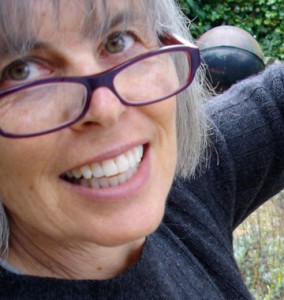 Nancy Burtch Hauk made the opposite journey, majoring in art history at Connecticut College before moving to Pacific Grove with her husband Steve and pursuing the important career of breaking down test biases for CTB–McGraw Hill, traveling the country and working with the late Ross Green, a national pioneer in the field of educational test assessment and publication. When she could find the time as a busy professional with two children, she painted scenes of Monterey, California and France, studying with Sam Colburn—who arrived on the Monterey Peninsula in the 1930s and knew and associated with many of the same artists John Steinbeck did—as well as National Academicians Gregory Kondos and Don Nice, Claire Verbiest, Gerald Brommer, Katherine Stock and Jann Pollard. Her friend Marty Clarke was her constant painting companion.
Nancy Burtch Hauk made the opposite journey, majoring in art history at Connecticut College before moving to Pacific Grove with her husband Steve and pursuing the important career of breaking down test biases for CTB–McGraw Hill, traveling the country and working with the late Ross Green, a national pioneer in the field of educational test assessment and publication. When she could find the time as a busy professional with two children, she painted scenes of Monterey, California and France, studying with Sam Colburn—who arrived on the Monterey Peninsula in the 1930s and knew and associated with many of the same artists John Steinbeck did—as well as National Academicians Gregory Kondos and Don Nice, Claire Verbiest, Gerald Brommer, Katherine Stock and Jann Pollard. Her friend Marty Clarke was her constant painting companion.
Capturing Essence, Like John Steinbeck
Most of the works in the Pacific Grove Library exhibition were painted between 2000 and 2010. They include French vignettes, scenes from Steinbeck Country, gardens of ancient adobes in Old Monterey, California, and innovative studies of Spanish missions integrating the decorative motifs that distinguish Mission San Juan Bautista and other churches built by Franciscan missionaries 200 years ago. Some of the selected paintings are incomplete, with the artist’s notes and practice brushstrokes illuminating her creative process as a fine artist. “Reflecting Reeds” (above) demonstrates her Zen-like mastery of meditative line and visual economy.
“Loving Watercolor, Paintings by Nancy Hauk” was curated by Julianne Burton-Carvajal and runs through May 30 in recently restored library gallery space located at 550 Central Avenue, a block from Lighthouse Avenue in downtown Pacific Grove. (Note to Steinbeck lovers visiting Monterey, California in April or May: don’t miss the experience of seeing Steinbeck Country through the eyes of a contemporary fine artist with a talent for capturing the essence of every scene—just as John Steinbeck did when writing about his favorite places from the comfort of his Pacific Grove cottage years ago.)
Big Sur’s “Dark Watchers” Subject of Sumptuous Book By Thomas Steinbeck and Artist Benjamin Brode
John Steinbeck’s short story “Flight” is haunted by “dark watching men” whose gaze must be avoided if encountered in the mysterious mountains of Central California’s Big Sur. The writer Thomas Steinbeck, the author’s son, has collaborated with Benjamin Brode, the Big Sur landscape artist, in a beautiful word-and-picture book about these curious creatures out of some Jungian archetypal dream. Published in 2014 by Steinbeck Press, In Search of the Dark Watchers: Landscapes and Lore of Big Sur proves that some pictures really are worth a thousand words when they come from the collective unconscious.
As an adult, John Steinbeck read Carl Jung and understood archetypes. But according to Thomas Steinbeck, the idea was first planted in John’s imagination by his mother Olive, a true believer who—like Mama in “Flight”—warned her son to respect the Dark Watchers’ sovereignty over Big Sur’s dangerous terrain. Thomas Steinbeck wrote a short story called “The Dark Watcher” that further embellished the Steinbeck family fable, inspiring Benjamin Brode’s moody, mystical paintings in pursuit of the elusive spirit-beings said to inhabit Big Sur. Don’t worry. You won’t need Carl Jung to appreciate the art or text in this coffee-table delight. But follow Olive Steinbeck’s advice. Exercise care if caught—like Pepe in “Flight”—alone in the Big Sur woods at night. As Carl Jung discovered, disturbing dreams can come true.
Hollister, California, the San Benito County Town Where The Other Steinbecks Lived
In East of Eden John Steinbeck wrote imaginatively about the Salinas Valley Hamiltons—grandparents, aunts, and uncles on his mother’s Scots-Irish side. But his father Ernst Steinbeck’s people, solid Central California farmer-entrepreneurs living east of Salinas, were also important in the writer’s early life. Folks in Hollister, California, the San Benito County village where the family migrated from New England in the 1870s, like to remind visitors that Steinbeck Country starts in their city, a peaceful farming community set among the rolling hills near historic Mission San Juan Bautista. When John Steinbeck was growing up in Salinas, Hollister was a day’s ride over the steep San Juan Grade, so the Hollister Steinbecks weren’t around as much as the familiar Hamilton clan. But the dramatic story of how they came to Central California is, if anything, even more memorable than that of the Hamiltons, and Steinbeck wrote about it in the 1960s.
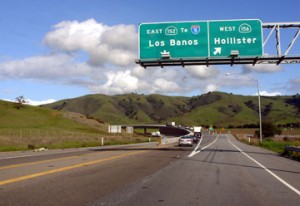 Present-day Hollister—the San Benito County, California seat—is a 10-minute drive east off Highway 101 north of Salinas, a must-make side trip whether your primary destination is San Juan Bautista, Monterey, or Salinas, 20 miles to the south on 101. In a curious episode of Steinbeck Country history, the creation of San Benito County was the result of Salinas ambition, and a certain Hollister-Salinas-Monterey rivalry can still be felt when the subject comes up in conversation. The Central California coastal mission settlement of Monterey—California’s first capital—was the original seat of Monterey County, which extended east to include San Benito County when California became a state in 1850. But Salinas Valley farming grew fast following the Civil War and civic boosters in Salinas got ambitious, winning a referendum in 1874 that moved the Monterey County seat to their town. Votes from Hollister and San Juan Bautista—so goes the story—were influenced by the promise to carve out a new San Benito County with a Hollister, California seat.
Present-day Hollister—the San Benito County, California seat—is a 10-minute drive east off Highway 101 north of Salinas, a must-make side trip whether your primary destination is San Juan Bautista, Monterey, or Salinas, 20 miles to the south on 101. In a curious episode of Steinbeck Country history, the creation of San Benito County was the result of Salinas ambition, and a certain Hollister-Salinas-Monterey rivalry can still be felt when the subject comes up in conversation. The Central California coastal mission settlement of Monterey—California’s first capital—was the original seat of Monterey County, which extended east to include San Benito County when California became a state in 1850. But Salinas Valley farming grew fast following the Civil War and civic boosters in Salinas got ambitious, winning a referendum in 1874 that moved the Monterey County seat to their town. Votes from Hollister and San Juan Bautista—so goes the story—were influenced by the promise to carve out a new San Benito County with a Hollister, California seat.
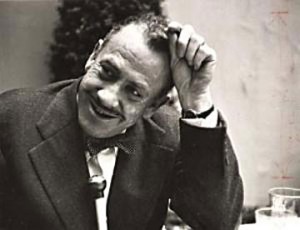 John Adolph and Almira Ann Steinbeck, young John’s Hollister grandparents, grew apricots and operated a dairy, eventually moving into town once their five sons (John Steinbeck’s father Ernst among them) had families of their own. But their roots were in Puritan New England, where Almira’s pious father was known as Deacon Dickson, and Protestant Prussia, where John Adolph and his brother were wood-craftsmen before packing up for Palestine in 1850 with a sister and her husband, a Lutheran missionary. There they met the daughters of Deacon Dickson, a Massachusetts farmer on a mission to the Holy Land, marrying two of the girls in Jerusalem in 1856. Murder, rape, and escape ensued, and the third Dickson sister eventually settled in Hollister, California, too, along with Adolph, Almira, and their five sons. The future novelist was familiar with the family’s story of violence and flight from Palestine to America, and he admired his father’s hardworking people, from whom he inherited hands that liked to garden, fabricate, and repair things. His writing in the 1960s expresses the abiding connection he felt with the prolific San Benito County branch of the Steinbeck family tree.
John Adolph and Almira Ann Steinbeck, young John’s Hollister grandparents, grew apricots and operated a dairy, eventually moving into town once their five sons (John Steinbeck’s father Ernst among them) had families of their own. But their roots were in Puritan New England, where Almira’s pious father was known as Deacon Dickson, and Protestant Prussia, where John Adolph and his brother were wood-craftsmen before packing up for Palestine in 1850 with a sister and her husband, a Lutheran missionary. There they met the daughters of Deacon Dickson, a Massachusetts farmer on a mission to the Holy Land, marrying two of the girls in Jerusalem in 1856. Murder, rape, and escape ensued, and the third Dickson sister eventually settled in Hollister, California, too, along with Adolph, Almira, and their five sons. The future novelist was familiar with the family’s story of violence and flight from Palestine to America, and he admired his father’s hardworking people, from whom he inherited hands that liked to garden, fabricate, and repair things. His writing in the 1960s expresses the abiding connection he felt with the prolific San Benito County branch of the Steinbeck family tree.
 Call the San Benito County Historical Society Museum before your next trip to Central California and see for yourself. The not-for-profit facility is open by appointment only, but the hospitable volunteers who make it run are proud of their heritage and know a lot that isn’t in books about John Steinbeck. Hollister, California is right: “Steinbeck Country starts here!”
Call the San Benito County Historical Society Museum before your next trip to Central California and see for yourself. The not-for-profit facility is open by appointment only, but the hospitable volunteers who make it run are proud of their heritage and know a lot that isn’t in books about John Steinbeck. Hollister, California is right: “Steinbeck Country starts here!”
Street Symbolism in Salinas, California: Episcopal Church Headquarters Move into John Steinbeck’s Neighborhood
John Steinbeck’s childhood church’s headquarters and his boyhood home in Salinas, California are now neighbors. Earlier this month the Diocese of El Camino Real, the administrative division of the Episcopal Church that includes Salinas and Monterey, moved its headquarters from a modern office building near Monterey to the B.V. Sargent House, built in 1896 and located at 154 Central Avenue, only three blocks from the 1897 home where John Steinbeck was baptized in 1905. Since 1974 the John Steinbeck House at 132 Central Avenue has been operated as a restaurant and history-minded visitor destination by the Valley Guild, a non-profit group. Before its purchase by the regional Episcopal Church, the more opulent Sargent House was the address of a local law firm, although its distinctive stained-glass windows and John-Steinbeck-played-here past are among its memorable characteristics. John Steinbeck’s corner home was constructed in the Queen Anne Victorian style popular in architectural pattern books of the time. The imaginative architect William Weeks chose the less traditional Modified Colonial style when he designed the Sargent House, originally occupying an entire block, for its prominent owner. John Steinbeck’s father Ernst was the treasurer of Monterey County. Bradley Sargent Sr. was a county supervisor and state senator. His son Bradley Sargent Jr. became Monterey County’s district attorney and a superior court judge.
John Steinbeck’s father Ernst was the treasurer of Monterey County. Bradley Sargent Sr. was a county supervisor and state senator.
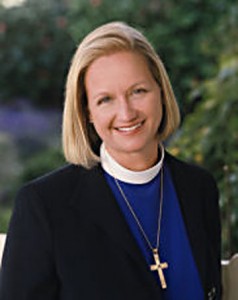 The Diocese of El Camino Real serves Episcopal churches throughout Steinbeck Country, from Silicon Valley to the San Luis Obispo area. Commenting on the symbolism of the move to Salinas, the Rt. Rev. Mary Gray-Reeves, the vibrant bishop who speaks fluent Spanish, explained: “We needed a site that was centrally located within our diocese, but we also wanted to make a statement in the City of Salinas by our presence. Buildings do speak in a community. We are in the midst of not only government and commercial buildings, but we as a church will be in the midst of the struggles of real life. Sargent House is one of the grand old homes of Salinas and it stands beautifully in the diocese, a witness to our commitment and ministry.” Whether divinely ordained or simple coincidence, however, the sudden proximity of the not-for-profit entities now housed in the pair of historic properties in the heart of Steinbeck’s hometown has special meaning for Steinbeck lovers everywhere.
The Diocese of El Camino Real serves Episcopal churches throughout Steinbeck Country, from Silicon Valley to the San Luis Obispo area. Commenting on the symbolism of the move to Salinas, the Rt. Rev. Mary Gray-Reeves, the vibrant bishop who speaks fluent Spanish, explained: “We needed a site that was centrally located within our diocese, but we also wanted to make a statement in the City of Salinas by our presence. Buildings do speak in a community. We are in the midst of not only government and commercial buildings, but we as a church will be in the midst of the struggles of real life. Sargent House is one of the grand old homes of Salinas and it stands beautifully in the diocese, a witness to our commitment and ministry.” Whether divinely ordained or simple coincidence, however, the sudden proximity of the not-for-profit entities now housed in the pair of historic properties in the heart of Steinbeck’s hometown has special meaning for Steinbeck lovers everywhere.
‘Sargent House is one of the grand old homes of Salinas and it stands beautifully in the diocese, a witness to our commitment and ministry.’
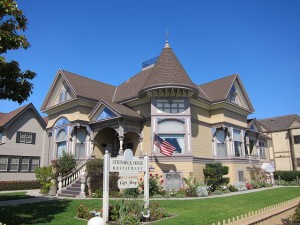 When John Steinbeck was confirmed by a visiting bishop from Nevada at St. Paul’s Episcopal Church one hundred years ago, Salinas, California was a small town of 2,500, mostly white citizens, and the Episcopal church was a social center for prominent families like the Steinbecks. Today the city’s population of 150,000-plus is largely Hispanic, and St. Paul’s Episcopal Church celebrates services in both English and in Spanish. The old St. Paul’s Episcopal Church building that John Steinbeck knew as a boy is gone, and the ultra-modern National Steinbeck Center—located within walking distance of the Steinbeck and Sargent Houses—may become the property of California State University Monterey Bay in a deal negotiated with Salinas, California taxing authorities. Like the Episcopal Church in the United States, the City of Salinas, California struggles with questions of economics, identity, and inclusiveness posed by John Steinbeck in his writing. During his lifetime he said he didn’t want anything fancy named for him by his hometown. But it’s likely he’d be pleased with hopeful signs of progress in Salinas—and that he’d welcome Central California’s Episcopal Church headquarters to the neighborhood where he played while growing up there.
When John Steinbeck was confirmed by a visiting bishop from Nevada at St. Paul’s Episcopal Church one hundred years ago, Salinas, California was a small town of 2,500, mostly white citizens, and the Episcopal church was a social center for prominent families like the Steinbecks. Today the city’s population of 150,000-plus is largely Hispanic, and St. Paul’s Episcopal Church celebrates services in both English and in Spanish. The old St. Paul’s Episcopal Church building that John Steinbeck knew as a boy is gone, and the ultra-modern National Steinbeck Center—located within walking distance of the Steinbeck and Sargent Houses—may become the property of California State University Monterey Bay in a deal negotiated with Salinas, California taxing authorities. Like the Episcopal Church in the United States, the City of Salinas, California struggles with questions of economics, identity, and inclusiveness posed by John Steinbeck in his writing. During his lifetime he said he didn’t want anything fancy named for him by his hometown. But it’s likely he’d be pleased with hopeful signs of progress in Salinas—and that he’d welcome Central California’s Episcopal Church headquarters to the neighborhood where he played while growing up there.
CSU Monterey Bay and National Steinbeck Center Consider Joint Venture in Downtown Salinas, California
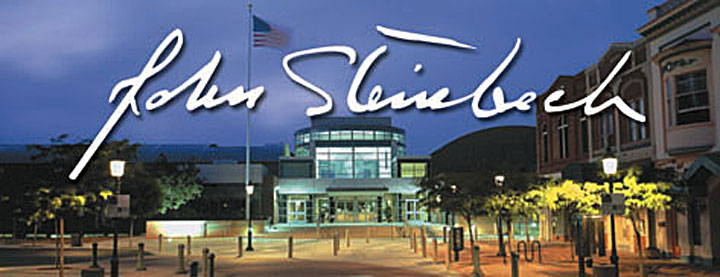
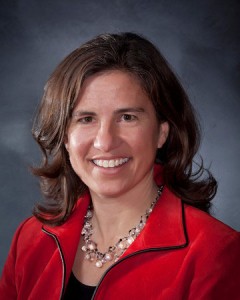 Colleen Bailey, executive director of the National Steinbeck Center in Salinas, California, reports encouraging new developments for the institution, located at One Main Street, a few blocks from where John Steinbeck lived as a boy. In addition to housing a major Steinbeck archive, the Center features interactive exhibits and rotating exhibitions and sponsors the annual International Steinbeck Festival. A 501(c)(3) not-for-profit membership organization, it operates on grants, gifts, and donated services from individuals, foundations, and other sources. Since opening in 1998, its capacious building has attracted international attention and traffic to Salinas, the largest city in Monterey County.
Colleen Bailey, executive director of the National Steinbeck Center in Salinas, California, reports encouraging new developments for the institution, located at One Main Street, a few blocks from where John Steinbeck lived as a boy. In addition to housing a major Steinbeck archive, the Center features interactive exhibits and rotating exhibitions and sponsors the annual International Steinbeck Festival. A 501(c)(3) not-for-profit membership organization, it operates on grants, gifts, and donated services from individuals, foundations, and other sources. Since opening in 1998, its capacious building has attracted international attention and traffic to Salinas, the largest city in Monterey County.
CSU Monterey Bay in Downtown Salinas, California?
CSU Monterey Bay—part of the California State University system—wants to extend its services eastward to Salinas, located less than a half-hour drive inland from CSU Monterey Bay’s main campus. Created in the mid-1990s during the period in which the National Steinbeck Center was being planned and built, CSU Monterey Bay occupies land in Seaside, California, formerly used by Fort Ord. It offers 23 undergraduate and seven graduate majors to 5,700 students, 37 percent of whom live in Monterey, Santa Cruz, and San Benito counties.
Under the proposed partnership, CSU Monterey Bay would own the National Steinbeck Center building and the Center would continue to operate at the location. Since 1902-1919, Steinbeck’s time growing up in Salinas, the city has become a majority Mexican-American community known primarily as an agricultural packaging and distribution center. The new corporate headquarters of Taylor Farms—an international distributor of foods, such as lettuce, grown in the Salinas Valley—is nearing completion on Main Street Center next to the Center.
According to Colleen Bailey, negotiations between various Salinas, California, Monterey County, and CSU Monterey Bay governing entities are progressing. At the time of this report, she anticipated discussion of the proposed partnership by the City Council—which also acts as the Salinas, California Redevelopment Agency—as early as next week. She notes that 13 local taxing authorities could benefit from repayment of the Center’s debt to the Salinas, California RDA.
The Red Pony, Bombs Away, and The Wayward Bus
The National Steinbeck Center serves as the custodian of an extensive collection of Steinbeck manuscripts, recordings, and objects acquired through donations to the Salinas, California Public Library that began before Steinbeck died. The collection’s scope, quality, and accessibility to researchers using the Center’s facilities have made it an international resource for Steinbeck scholars who can be found working in Salinas on books and articles about the author at almost any time. Three recent additions reported by Colleen Bailey demonstrate the archive’s extraordinary depth and diversity:
1. Bombs Away: The Story of a Bomber Team, Books Digest No. 5 (1942) (21 pages);
2. The Wayward Bus, final shooting script, Twentieth Century Fox (1956) (122 pages);
3. The Red Pony, cutting continuity script, Republic Pictures Corporation (85 pages).
For more information about the archive and the 2105 Steinbeck Festival, visit the National Steinbeck Center website.
A Mild Concussion: A Play in Two Acts by Steve Hauk
Major creators, whether in the arts or sciences, are often victims of their own creativity. Literary work is plagiarized, inventions are stolen. The creative force behind television, Philo Farnsworth, is one example of the latter. The computer age is no exception. Stories are legion of ideas stolen or plagiarized. In most cases the usurpers are not particularly creative but adept at business and gaining an edge, while the creators are often inept when it comes to the world of business, or simply not interested. There have been exceptions to this, Thomas Edison among them. This play is about a creative genius lacking the ruthlessness to rank profit over an idealistic outlook. In some ways he sets himself up for failure, which is no reason that he should be exploited. The play is very loosely based on something that really happened, but does not pretend in any way to be a history. As I write early in the directions, “all is in doubt.” Yet not quite all is. There is no doubt Ryan was brilliant and idealistic and that he was exploited and eventually destroyed. If it was in part through his own character flaws, it was as much through those who preyed on him for their own profit and glorification.
A Mild Concussion
The Rapid Rise and Long Fall
of an Idealistic Computer Genius
A play in two acts
by Steve Hauk
Copyright © 2014 by Steve Hauk. All rights reserved.
Characters:
RYAN, a computer scientist
DONNA, his wife
ROBIN, once worked for Ryan
JOHN PERSONS, a microcomputer entrepreneur
JIM, associate of Ryan’s
FIRST MAN, representing a giant company
SECOND MAN, the same
A YOUNG NURSE
Act One
The First Day
Music. Hard rock. Dancing. Sensual and menacing figures. All
figures except Ryan suggested by shadows. Ryan staggers, falls,
striking his head. He wears jeans, cowboy boots, a vest. This is a
memory play. A slight haze over everything, a surreal quality.
Nothing is absolutely real. Just glimmers of reality and the
perception of what might or might not have been. All is in doubt.
A siren. Figures _ shadows or silhouettes _ gather around Ryan’s
body. He struggles to his knees. Siren dies out. Figures back
away. Then the figure of a woman approaches; Ryan holds out
his hand, she takes it. He stands.
Blackout. Music stops. Lighting up to indicate the spare
representation of a living room, a few pieces of furniture, a small
bar. Ryan in a chair, his eyes closed. No longer wearing the vest.
The same woman sits by him, holds a damp cloth to his forehead.
Ryan is in his early fifties. He is slim, roughly handsome. Until a
year or two ago he was in fine physical condition, but since then
he has gone through particularly bad times and shows it _ some
darkness under his eyes _ which can still sparkle at times with a
high degree of intelligence and humor _ gauntness in his face,
and a slowness of movement brought on by the fall he has just
taken, and alcoholism.
She _ Robin _ is a woman in her early forties, attractive. She is
dressed for an evening out of respectable club and/or bar-hoping
_ but the night has dragged on excessively and punishingly and
she and her clothing show it.
On the periphery, in their own light and surrounded by shadow,
two men in suits, standing together; Jim and Donna, standing
together; John Persons, alone; the Nurse, alone.
A suspended window indicates darkness. The outside lighting will
move toward dawn at the end of the first act.
ROBIN (To audience): Ryan makes me think of a bird called
killdeer. He’s wounded _ in many ways _ and the Killdeer is a bird
which continually plays the wounded creature . . . This time,
though, Ryan is truly wounded, and that also eventually happens
to the killdeer . . . (Smiles.) Of course.
DONNA: I’m not surprised Ryan found a woman to take care of
him _ he was always good at that. God knows, I did it long
enough and helped him to achieve what he achieved. Isn’t that
what the first spouse always does? And then is thrown aside?
(Pause.) But he’s a gifted man . . . and sometimes I miss him,
especially his humor.
ROBIN: I hadn’t seen him for years, more than two decades.
Then, last night, I saw him on the floor of a local club, after a
terrible fall _ that’s what they think it might have been, a fall. It
could have been something else. There will probably be an
investigation. He opened his eyes, all these people around _
and recognized me! I couldn’t believe it. After all those years.
DONNA: Ryan died two days after the fall.
NURSE: He had been misdiagnosed . . . If they had brought me in
a little earlier . . . well, I take it back _ if the doctors missed it,
who’s to say I wouldn’t have, too . . . On the other hand, who’s to
say I would . . .
JIM: I had the feeling he was dead before he died . . . He gave
away so much in his life . . . it became a habit . . . and then he
gave away his life.
FIRST MAN IN SUIT: That’s meant for us _ his “giving away”
things.
SECOND MAN: Don’t believe it.
FIRST MAN: Slander, grounds for a lawsuit.
A moment, then they all look at Persons.
PERSONS: No comment _ for the moment. (Pause.)
Ryan opens his eyes. Robin removes cloth from
his forehead, looks at him.
ROBIN: Go slowly, please . . . you’re injured.
RYAN: No, I’m . . .
ROBIN (Just noticing): There’s blood, on the back of your head _
where you struck your head. Lift your head, please . . .
She raises his head, dabs at the blood with the
cloth.
RYAN (Pause): I drink . . . An everyday thing . . . What’s a
killdeer?
ROBIN: Oh . . . I thought you were . . .
RYAN: Out?
ROBIN: Yes . . .
RYAN: Well, I was . . . that doesn’t mean . . . (Studies her a
moment): I didn’t _ don’t know _ about this bird . . . Why is it
called a Killdeer?
ROBIN: That’s the sound it makes! `Killdeer! Killdeer!’ Especially
when it flies off after faking an injury.
RYAN (Pause): Why would it do that . . . what you just said _
fake an injury?
ROBIN: Well, it’s a silly bird _ a beautiful bird but a silly bird. It
makes it’s nest on the ground . . . in dunes . . . on a beach. So
very vulnerable, the nest and the eggs, and when they are born,
the chicks . . . If you approach the nest, the parents will limp off,
faking a broken wing or leg or whatever . . . lead you away from
the nest. Amazingly, it works. It would have to or the killdeer . . .
as a species . . . would be extinct.
RYAN: So not so silly.
ROBIN (A beat): No, I guess not completely silly _ when you think
about it. The ruse is clever, the silly part is making its nest on the
ground.
RYAN: Sounds like some people, doesn’t it? . . . Building on flood
plains, earthquake fault lines . . . you name it. . . . Anyway, I may
be silly but I’m not extinct _ yet.
ROBIN: You’re famous.
RYAN: You think so.
ROBN: Oh, sure, cover of Fortune, Time.
RYAN: People say that. I didn’t make Time . . . People imagine
that.
ROBIN: Well, Fortune, Newsweek?
RYAN (Pause): Maybe . . . It all blurs. Long time ago in any case.
(After a moment, looks toward window.) What time is it?
ROBIN: I don’t know . . . Wednesday, approaching dawn . . . very
early . . .
RYAN: This will sound stupid _ really dumb _ but the year? . . .
wait, I know _ 1995?
ROBIN (Smiles): You get an `A.’
RYAN (Thinks a moment, then with a sheepish smile) : I’m afraid I
don’t know the month.
ROBIN: July, late July.
RYAN (Pause.) I apologize for this because I know I should, but
. . . but I’m afraid I don’t know you.
ROBIN (Pause): I worked for you, a long time ago. (Pause.) My
name’s Robin.
RYAN: You worked for me _ the early days?
ROBIN: There were a lot of us; I was one of dozens. No reason
for you to remember me . . . I wasn’t one of the `geniuses’. . . But
you were encouraging. I was young, I didn’t know how rare that
would be _ encouragement. I’ve always appreciated the way you
treated me . . . the others.
RYAN: Thank you . . . I’m in my home? (Smiles.) I mean, it feels
familiar _ is it?
ROBIN (Nods): I drove you here, in your car. You gave me
directions . . . when you could.
RYAN: It was a long haul . . . difficult, I’m sure . . . sorry. Drunk
passenger, no street lights to speak of . . . People get lost trying
to find this place in the daytime . . . sober. (Pause.) So . . . what
happened?
ROBIN: You don’t remember anything?
Ryan starts to stand.
ROBIN: I wouldn’t . . .
RYAN: I need to . . . (He takes a few steps, shaky; she hovers
nearby, at first a hand on his arm.) So, I drank too much . . .
ROBIN: I’m sorry _ did you hear me when I said you struck your head?
RYAN (Somewhat forced blase’): I was drinking _ right? _ and
stumbled . . .
ROBIN: You were drinking, yes _ but add to that, you took a
nasty, heavy fall . . . I really can’t overemphasize . . . I heard the
thud across the room _ over loud music, loud talking . . . We all
did . . . Fifty, sixty people, some drunk . . . I saw you on the floor.
That’s when I recognized you. (Pause.) I really do think we should
get you to a hospital. (Pause.) Since we arrived here you’ve been
talking to people . . . people who are not here.
RYAN: Have I? . . . been doing that lately . . . Anyone in
particular?
ROBIN: Your wife, I mean your first wife . . . Donna . . . she
treated me well, too . . . your children . . . other voices . . .
(Pause.) You don’t remember anything before? . . . An ambulance
was called, you refused attention . . . said you’d be OK.
RYAN: I was with? . . .
ROBIN: You were alone as far as I could tell. (Pause.) Well, no
one claimed you. I just happened to be there. You recognized me
. . . (A beat; a little embarrassed.) . . . then. . . for a moment at
least . . . Held your hand out to me . . . I was surprised you’d
remember me . . .
RYAN: Did I say your name?
ROBIN: No. You didn’t know it . . . I brought you here, to your
home, at your request, since there didn’t seem to be anyone else.
I was happy to do it because . . . Well, you seemed very alone for
. . . (Pause.)
RYAN: For . . . ?
ROBIN: For who . . . whom you are . . . (Pause.) But now . . .
RYAN: Yes?
ROBIN: I don’t think you should have refused medical attention
. . . You should have let them . . . the paramedics . . . take you to
the hospital.
RYAN: Well, I don’t remember and I’m OK . . .
ROBIN: That’s what I thought at first . . . hoped . . . sober you up
_ everything’s fine . . . I’ve done it before _ not with you, other
guys . . . it’s well known you drink . . . but _ you see _ you’ve
been in and out of consciousness . . . several times . . . the last
few hours . . . So I think . . .
RYAN (Simply): It’s happened before.
ROBIN: Has it? . . . . Really?. . . Pass out, come back like that?
Really? . . . I need to tell you, this is the first time you’ve been . . .
conversant.
RYAN (Small smile): With you, you mean?
ROBIN (Also smiles): Right, you’ve been conversant with others,
but not me. (Pause.) And the police _ they’ve called. Several
times. They want to talk to you _ when you’re able.
RYAN (Pause, serious): What do the police want?
ROBIN: To know what happened, naturally . . . Stand still. (She
pushes the hair off his forehead.) I don’t know how you can see
and we don’t want you tripping . . . and because it was . . . violent
. . . your accident . . . and because of who you, who you are . . .
RYAN: Was, you mean, before it all went to hell . . . I’m not
anyone anymore . . . to speak of . . .
He looks at her a moment, attracted, but moves
away.
ROBIN : Where are you going?
RYAN: The bar _ something to hold onto . . . not to drink . . .
ROBIN: You’re talking about . . . it went to hell six, seven years
ago?
RYAN: Around. Little longer. I don’t remember a lot at the best of
times . . . lately . . . a kind of ongoing fog . . . And now . . .
(Pause.) Hey, are you a reporter? . . . (Smiles.) I was on my way
then . . . injured but not faking it, no kill . . . what do you call that
bird?
ROBIN: Killdeer. It’s called a killdeer. A precocial species _ as in
precocious _ chicks born with their eyes open, able to run in
minutes . . . from predators.
RYAN (A beat): No killdeer, not me . . . I get caught . . . Why do I
have a headache?
ROBIN: Well, that fall.
RYAN: Oh, right . . . slipped my mind, not a good sign.
ROBIN (Pause): It was _ what? _ fifteen, twenty years ago you
got the idea?
RYAN (Suspicious): How do you know this?
ROBIN (Smiles to reassure him): I followed your career _ in the
papers, the computer magazines. I’m sure thousands of people
know that.
RYAN: Sorry, you’re right, of course . . . Stupid of me. (Pause.)
I’ve been . . well, no reason, really, to care anymore, what gets
out . . .
ROBIN (Pause): Years later _ about the time you did it and
became famous _ I read a quote by you, “It will change the world
as we know it.” And it did and I thought . . .“I knew him once . . .”
RYAN (Looks at her a moment, smiles): “The computer world as
we know it.”
ROBIN: An operating system to tie all personal computers in the
world into . . . (Genuinely curious.) I’ve always wondered _ do you
mind if I ask? _ if I’d put a few thousand in at that time _ not that I
had it _ what would I be worth today? A million? Ten? Something
like that?
RYAN: But your life would have spiraled downward, Robin. You’d
be a major depression case with the rest of us. The industry is
littered with bodies _ and souls.
ROBIN: You changed the world.
RYAN (Politely correcting): The personal computer world.
ROBIN: Well, almost the same thing.
RYAN (Considers pouring a drink, pushing a glass around bar
surface): But not quite . . . No one remembers anyway.
ROBIN: I do _ was it exciting?
RYAN (A beat _ his natural, broad humor beginning to return,
turning away from the glass): Oh, sure _ most exciting moment in
my life, except the time I visited Niagara Falls. Anyway, your ten
million, that’s stretching it. That’s about what what’s his name
offered me for the whole company a year ago.
ROBIN: Who’s what’s his name?
RYAN: You know . . .
ROBIN: Who?
RYAN: What’s his name . . . (Indicates his head and trouble
thinking.) . . . Oh, boy . . . guess I did hit it pretty hard . . . guy with
the glasses and slicked down hair . . . Most depressing day in my
life, except the time I visited Philadelphia. I said _ this was very
late in the game, understand _ just last year if I recall _ heyday
over, bottom falling out, I fly to see him _ I say _
Lighting change. Robin gone. John Persons, older,
steps forward, in a rumpled gray suitcoat over a red V-neck
sweater. We will see him at various times at age twenty-two
or so, to his present age of forty-three or forty-four.
He wears rumpled slacks and a red V-neck sweater over a
white button-down; when he plays older he wears the gray
suitcoat he has on now; when younger, he does not wear the
suit coat. Persons is average looking, his hair slicked down
but not enough to hold down his natural cowlick; he wears
glasses and could probably lose a few pounds. He is a very
intense, difficult-to-ignore presence. He is pushy, combative,
quick on his feet.
RYAN: How can you offer so little after what you did _
PERSONS: What?
RYAN: You know . . .
PERSONS: No, I don’t. Is this why you wanted to see me, Ryan,
recriminations? . . . because I’m busy and _
Starts to leave.
RYAN: No, don’t go, John, please . . . We’re in trouble and _
PERSONS (Turning back to him; subtly aggressive): You arrive
unannounced . . . Do you think I can just drop every _ who’s in
trouble?
RYAN: The company and, and _
PERSONS: Sure it is. I know that. The industry knows that. Why
you’re here. Are you blaming us?
RYAN: Because _
PERSONS: Look!
RYAN: No, I don’t _
PERSONS: You want _ need _ to sell?
RYAN (Some pain): I can’t remember this _
PERSONS: What? Remember what?
Light dims on Persons as he takes a few
steps back. Robin back in light, moving
close to Ryan.
RYAN: _ remember this now. I don’t want to . . . not now . . . head
throbbing . . .
ROBIN: Remember what? . . . Are you OK?
RYAN (Smiles sheepishly, a beat): Sorry . . .
ROBIN: I’m calling the hospital . . .
RYAN: No, please _ get the hospital involved and the police will
follow for sure; this business, everyone hears everything . . . I
need to sort this out . . . come to some . . . resolution . . . He
called. Persons. Years ago. When I first met him. The first time.
No one’d heard of him.
ROBIN: Persons? Do you mean John Persons? Everyone in the
world has heard of John Persons.
RYAN: Not then. I was on all those covers before Persons . . .
The idea was still forming . . . coming together as a concept. I was
close . . . and excited. Floating, every day _ floating in this unreal
world of ecstatic anticipation. Everything was better . . . food . . .
sex . . . driving fast . . . flying! . . . I couldn’t wait to get back to the
tool shed and the computer and begin composing. I hadn’t been
so excited since the day . . . (Searching.)
ROBIN: You saw Niagara Falls?
RYAN (Gives her a funny look): Yes _ Niagara Falls! How can
anyone forget Niagara Falls? . . . I don’t know what’s going on
with my head. So one day I received a call from . . . (Searching.)
ROBIN: Persons.
RYAN: Yes _ Persons! He had been thinking of forming a
company _ inspired by mine! . . . That’s what he said . . . he was
in town. Could he drop by? Donna welcomes everyone. We
invited him to dinner, to spend the night. Persons was so young. I
was, back then? . . .
ROBIN: Twenty-nine, thirty?
RYAN: Thank you, about that _ almost decrepit. He was twenty-one,
-two, something like that . . . looked fifteen . . .
Lighting change. Robin backs away. Persons, appearing
much younger, minus suit coat, and Donna step forward.
She is dark, attractive, wears dark slacks and a white
blouse.
PERSONS: . . . kind of you to invite me . . .
RYAN: . . . sounded twelve.
PERSONS: I know it was sudden . . . but driving up the coast
. . . passing though . . . lovely house . . .
RYAN: Not much room . . . two small kids . . . I work in a tool
shed _
PERSONS: Well, we’re all struggling, aren’t we? . . . Looking for
our niche _
RYAN: _ and the payments . . .
PERSONS: _ pioneer days. I heard someone say that recently,
good description. We’re like (Indicating he and Ryan.) Lewis and
Clark . . . (Smiles.) Navigating upriver . . . against the current . . .
Anyway, money shouldn’t be a problem long for you . . . from
what I hear.
DONNA: What do you hear?
They both look at her.
RYAN: Drink, John?
PERSONS: Thank you, but I don’t drink . . . You do?
RYAN: Now and then. Sure.
PERSONS: I don’t disapprove, not at all. But surprising, someone
with your gifts . . . Something could happen to that talent, couldn’t
it? Isn’t that a concern . . . with genius, you don’t want to . . . rock
the boat, do you?. . .
RYAN (Uncomfortable): No. Well, I . . . maybe I do . . .
PERSONS: They say you’re working on an interesting operating
system . . . intriguing concept . . . bold application . . . almost
visionary . . .
RYAN: I wish. Right now I’m just at the point of, of _
DONNA: Shouldn’t we eat? . . . John? . . . Ryan?. . . (Pause.)
Hungry?
They look at her. Persons considers. Lighting change
as Donna and Persons step back, just Ryan and Robin.
RYAN: So he stays over. We talked and talked. He stayed up
late. Maybe the whole night. I got up to go to the john about _
well, like this hour, whatever that is _ and saw the light under his
door . . . I heard him on his computer, tip-tapping away. He left
early, before we woke . . . (Pause.) He left a thank you note . . .
Ryan unsteadily walks front, distracted.
ROBIN: He was typing?. . .
RYAN: Something . . . (Puzzles, smiles.) . . . The thank you note?
. . . At the time . . . at the time as I recall . . . I didn’t think anything
of it. Well, maybe that he was composing, being creative . . . Now
I know _ how wrong that was . . . His mind doesn’t work that way
. . . Instead, he . . . (Pause.) Sorry . . . But I envied him at that
moment, if that was what I was thinking about. Everything’s fuzzy
now, so can’t be sure of anything . . . that fall _ that’s what you
said, right, I took a fall? (Pause.) What I meant is, I can’t work at
night. Too bad. For me the night’s for other things. Why I get in
trouble _ for instance, last night _ (Smiles at her.) _ if we’re to
believe the rumors. (Pause.) I need to work on that . . . once I
clear my head. Once this . . . headache . . . goes away . . .
(Pause.) Donna wasn’t sure about him . . . reserved judgement.
Suspicious, as I recall . . . she has better instincts . . . than I . . .
He showed up several times over the next year or so . . . usually
unannounced . . . as I got closer to . . . to . . . (Can’t find the
word.)
ROBIN: `Composing’ ? _ Composing it?
RYAN: Yes! _ as it became more clear . . . clearer . . . as I began
to finally visualize it . . . (With difficulty.) . . . to conceptualize . . .
the program . . . he must have known, an instinct . . . But then I
think . . . (Depressed.) I’m sorry, what did I just say?
Light dimming. Persons approaching, wearing the
rumpled suit coat, older demeanor.
PERSONS: Are you blaming us?
RYAN: What?
PERSONS: Are you saying we stole from you? Because if that is
what you are saying _
RYAN: No, of course not. Did you?
ROBIN: What?
Lighting change as Persons steps back.
RYAN: Oh, thinking of something else. Not very well. Something
that happened more recently _ not clear what, but it nags at me
. . . Wondering _ just at this moment _ if I was pushed.
ROBIN: Your fall? . . . . Last night? . . . You said you didn’t
remember.
RYAN: Something’s come back . . . a glimmer . . . and feeling . . .
a soreness in my back, as if someone had shoved me. Perhaps
that precipitated the fall. Of course, I was so bombed, it wouldn’t
have taken much, much of a shove . . . I’ve dissipated badly . . .
muscle tone goes, balance follows . . . I think that’s the sequence
. . .
ROBIN: They said . . . (Pause.)
RYAN: Said . . . ?
ROBIN: . . . you knocked over a stool, falling. Perhaps that
accounts for _
RYAN: Who said?
ROBIN: Television news.
RYAN: Television? Television has it? (Looking off, looking back.)
And . . . what did television say again?
ROBIN: That you knocked over a stool _ when you fell.
RYAN: And so the soreness in my back . . . Sure. I guess . . . But
why did I fall?
Spot on Persons, in suit coat, as he comes forward
a few steps, chin out.
PERSONS: Are you blaming us, Ryan?
RYAN: What?
PERSONS: Are you saying we killed you? _ that is, rather,
caused your fall? . . . Because, Ryan, if that’s what you are
saying _
RYAN: No! Yes! Did you? (Pause, looks at Robin.) Did I just say
something? I did, didn’t I? It’s . . . I’m dizzy . . .
Persons steps back, spot off.
RYAN (Looking at audience, but to himself): John Steinbeck got a
call one day from his hometown _ Salinas . . . California . . . It’s,
it’s 1938, or around then and he’s in a little cottage twenty miles
away on the coast putting the finishing touches on “The Grapes
of Wrath.” A woman _ friend for years, high school classmate _
calls and says, “John, what’s this talk you think people are after
you because of what you’re writing? It’s not so! We all love you!
We’re having a picnic today in Salinas. Please come. We want to
see you, like the old days.” . . . So he went and it was great for
him _ a picnic in the sun . . . life rich, heady _ the promise of a
great novel . . . friends, warmth, wine . . . and then two cowboys
approach and one sticks a gun under his chin and says, “If you
write another fucking word about farm workers being exploited,
we’ll blow your fucking head off.” (Pause.) Well, they didn’t,
because all those people were there . . . otherwise . . . and
Steinbeck overcomes . . . the trauma . . . and writes for another
thirty years . . . but the gun stuck under his chin was real . . . it
could have gone off and we wouldn’t have. . . what? . . . “East of
Eden.” (Pause.) He thinks about such things. He knows himself
and he knows what he might do if he lives. He moves to the East
Coast _ to New York. He applies for and receives a license to . . .
naturally . . . own a gun. (Pause.)
Lighting change.
ROBIN (Coming forward, to audience): All kinds of stories came
out about what happened to Ryan that night . . . That a biker
brawl led to his death . . . He died from a heart attack . . . blow to
the head . . . suicide . . .
Lighting change.
RYAN: Slow suicide then . . . (Sexy smile.) Did we ever . . . Robin,
did we . . . ?
ROBIN (Smiles): You were faithful in those days . . . you looked
me up and down a time or two . . .
RYAN (Pause): Did I really ask what I think I just asked you or
am I . . .
ROBIN: You asked it.
RYAN (Smiles): But I didn’t try anything _ good and good. We
were close then . . . Donna and I . . . (Ryan temporarily loses his
balance, grabs a chair before Robin can get to him.) Fuck . . .
Ryan is temporarily in his own light.
RYAN: So he showed up a few months later . . . We’re all still
young . . . early 1974, maybe `73, somewhere in there. Right
decade, I’m sure. (Smiles, mocking himself.) Twentieth Century.
He . . . You know . . . (Frustrated.) . . . him! (Coming toward
Robin, searching _ before Robin can speak.) No! I’ll get it for
God’s sake! _ Persons! . . . John Persons. (Visibly relaxes.)
That’s it, you know . . . something eludes you, think of something
else . . . I used to advise my students to try it. That’s the way I
compose. Easy . . . not thinking directly of the problem . . .
Drifting, in a way . . .
A phone rings.
ROBIN: I’ll just be a moment, do not, Ryan . . . do not do anything
. . .
Lighting change. Persons, young, and Donna
approach as Robin moves off.
RYAN (Suddenly exuberant): . . . drifting, in a way . . . freeing the
mind! . . .
PERSONS (Eager): And then _ ?
RYAN: . . . I try, John, to let my subconscious kick in. Well, the
opposite of “try,” really . . . open the way for it is better . . . and
when it does _
PERSONS: When it does?
Donna turns away. Ryan and Persons, momentarily
sharing this world, do not notice.
RYAN: It’s like _ you know, John _ it’s so wonderful! It’s like _ it’s
what I imagine it’s like _ to compose music. It pours out, the
binaries becoming notes. And look _ when you look at it, isn’t the
computer keyboard like a piano? A chess board? Hell _ a lit up jet
control panel as you cross the country in the middle of the night
with the whole country sleeping below you . . . There’s a beauty
there, isn’t there? . . . Don’t you think . . . a kind of elegance?
PERSONS: Yes, yes, I think so, Ryan _ I know what you are
saying. I’ve felt this myself! . . . Those moments! . . .
RYAN: Or am I overstating it?
PERSONS: No, no, I don’t think so.
RYAN: I knew you’d understand, John.
PERSONS: Well, sure . . . it’s something . . . we both . . .
RYAN: We can talk.
PERSONS: Of course.
DONNA: How . . . how do you compose, John?
Lighting change, Persons and Donna
step back. Robin returns.
ROBIN: Well, that’s interesting _ now there’s a story that has you
falling off a ladder.
RYAN (A beat): What story?
ROBIN: A call just now about your fall last night.
RYAN: Oh, yes, the fall . . . I forget, but maybe that’s a blessing. I
thought the biker brawl story seemed . . . I mean, I ride, but . . .
ROBIN: But you were wearing a biker’s vest, Ryan . . . with
Harley-Davidson patches. I took it off you because there was
blood . . .
RYAN (Pause): Oh, well, sure, I wear that vest sometimes, but
would that cause a brawl? . . . (Shakes his head as if to clear it.)
Someone hit me, that’s what’s implied? Some biker? . . . And that
last one again _ ?
ROBIN: Falling off a ladder.
Ryan’s own light, dim, softly pulsing.
RYAN (Amused): Falling off a ladder in a `nightclub’? What would
I be doing on a ladder in a nightclub? Adjusting the lights?
(Grudgingly, smiles.) Well, I stick my nose in . . . Wait, you’ll see,
someday they’ll program lighting _ lighting “concerts,” on a disc,
gorgeous compositions of _ (Catches himself.) . . . All I
remember is _ all I remember is my head on the floor, looking up
at dancing bodies, thinking _ or maybe they were brawling bikers
looking like dancers _ I remember thinking, “Please do not step
on my head . . . Please, oh God, please do not let them kick me in
the head . . . I still have use for it . . . It has more to do . . . more to
. . . finish . . . ”
A silence. Lighting back to normal.
ROBIN: Do you?
RYAN: Have more to do . . . finish? Of course. (Trying to focus.)
People think you do something . . . you should be content with
that . . . even if that thing has been taken from you . . . Do you
think I want to spend the rest of my life . . . not doing what I was
meant to do? Not . . . testing myself?
ROBIN (Softly): Why did you go alone, Ryan?
RYAN: Go where?
ROBIN: The club . . the fall.
RYAN: Oh, the fall. Did I go alone? Did I? I don’t remember.
ROBIN: No one has come forward . . .
RYAN: To say they were with me? Then I guess I was alone.
What are you saying? I’m not popular? . . . That’s not news.
Word’s out I’m bad luck. The man who could have . . . could have
had it all . . . but let it slip through his fingers. (Pause, rubs his
forehead.) I did, didn’t I? . . . That’s what happened, isn’t it? . . . I
blew it. Made all the wrong moves.
ROBIN: I don’t know. I told you, I only know what I read . . .
RYAN: A lot of that _ this I do remember _ is bullshit. The stuff
with the suits, for instance _
ROBIN: Suits?
RYAN: Suits. The kind of people . . . I’m . . . I’ve always been . . .
uncomfortable with . . .
Lighting change. Donna and Jim step forward.
Jim is thirty-five, a straight-forward, uncomplicated
appearing person, casually dressed.
JIM: The “suits” are here, Ryan.
DONNA: They’ve taken a room in town.
JIM: They want to meet with you.
RYAN: The suits . . . Oh really, I can’t . . . You do it . . .
JIM: They want to talk to you. You’re the one they’ve come to see.
RYAN: I was about to leave for the track.
JIM: Look, Ryan . . . these are very powerful men. And this is an
important thing we are talking about, something we have been
working a long time to achieve . . .
DONNA: Jim’s right. It’s an opportunity that may not come around
again, Ryan. You should think about that.
JIM: The fruit of your genius, Ryan.
DONNA: They’ve come to us. That’s a point . . . Still, if you . . .
JIM (Glances at her, mildly disapproving): Not us to them. We
have the leverage at this point.
DONNA (Glances at him): That’s so, but it is Ryan’s creation.
JIM: But it’s for the taking now.
RYAN (Pause): We don’t need them. Money’s not a problem.
We’re doing fine. We’re growing.
JIM: Ryan, we’re talking more than fine _ we’re talking huge.
We’re talking the world _ the PC world. They can place our
operating system in every personal computer _
RYAN: _ In the world? Well, this is very exciting. As exciting as
the first time I saw _
DONNA (Cutting him off): Ryan, this is serious. Whatever
decision you make, I am with you. But I want you to think about it,
I don’t want regrets.
Donna waits. Ryan gives no sign of acknowledging
the gravity of the situation.
DONNA: Ryan?
RYAN: I’m sorry, Donna. I’m going to the track _ I’m going to take
the Lamborghini around the oval a few times.
DONNA: That is what you are going to do now _ race your
Lamborghini around the track?
Ryan nods.
DONNA (To Jim, who’s about to protest): No, let him be. (To
Ryan.) Do as you wish. I just hope this is what you really want.
She steps back. Jim looks after her, looks toward
Ryan, waits.
RYAN: I can think when I am behind the wheel. It . . . frees me up.
I thought she understood that.
Jim nods, shrugs, steps back.
Lighting change. Ryan and Robin.
ROBIN: Did you go racing that day?
RYAN: I think so.
ROBIN: Think so?
RYAN: The most traumatic episode in your life _ not dramatic,
traumatic _ do you remember everything? In the proper
sequence, scale . . . ? I’ve never been clear about that day . . . or
days. I wasn’t sure what had happened the day after it happened.
Time shifts . . . Events . . . incidents recede or become
exaggerated . . . What you imagine becomes real, and reality
becomes dreamlike . . . surreal . . .
Lighting change.
RYAN: . . . and you begin to doubt it.
DONNA (Not moving forward): Or, Ryan . . .
RYAN: Yes?
DONNA: Perhaps you simply don’t want to remember.
RYAN (Smiles): There’s that, too.
Lighting change.
ROBIN: What?
RYAN: Maybe I simply don’t want to remember.
ROBIN: And the fall _ ?
RYAN: Has nothing to do with my memory of that . . . those days
. . . (Frustrated.) I don’t think it does. (Pause.) I went racing _ no,
driving fast, racing myself. But the suits were there when I
returned. That part has been left out of the story. . . It’s a story
they love repeating. “The day he could have owned the world, he
drove around and around in circles” . . . It’s catchy _ even amuses
me _ and makes me look like an idiot . . . So of course they keep
it out there, keep it alive . . . Makes it seem I deserve what
happened to me . . . Justifies what they did . . . But I met with the
suits, that day or the next. Whenever the hell it was. I think I finally
realized it was a business _ as I drove around the track I realized
it was a business. It was as if the words were stenciled on the
windshield of the Lamborghini: It Is Business, Ryan. This is
Business.
ROBIN: What else could it have been?
RYAN: I’m not sure _ I had been a teacher, for a government
institution, what did I know about business? _ you teach, you
grade papers _ you hope you inspire and instill passion _ you get
your paycheck. Maybe I thought it was discovery . . . innovation
. . . education . . . fun! . . . those things . . . Things I would never
associate with what people call business. Anyway, it was new . . .
a new science; in a way an art, part mathematics part
composition, like music _ business hadn’t fully sunk its claws into
it . . . yet. It _ software, the concept of it _ was still . . . virgin . . .
territory. No one knew how to copyright it, protect it . . . No one
knew if you could copyright it. All I knew was suddenly I was
doing it _ and doing it well! And it was consuming me! (Pause.) As
I remember. (Pause.) If I remember. So we met . . .
Lighting change. Misty, shadowy. The two men in
suits approach. Their faces kept in shadow.
RYAN: There had been three suits. One had left _ to report back
to suit headquarters, I suppose. So we met _ and I knew it was
business. (To them.) You propose? I think you have a proposal
for me.
FIRST MAN: You’ve kept us waiting, you know.
RYAN (Uncomfortable, awkward, but trying to assert himself):
Sorry. I was involved in something . . . Tell me what’s on your
minds.
SECOND MAN: You know who we are and you kept us waiting
anyway.
FIRST MAN: We flew across the continent to meet with you.
SECOND MAN: In the company jet _ one of the company jets.
FIRST MAN: Don Hatcher had to return to the home office
RYAN: Don Hatcher? . . .
FIRST MAN: There were three of us. Now there are two.
SECOND MAN: Don’s reporting on what’s gone on here.
FIRST MAN: Which has been very little. The story is you brushed
us off to drive a car around a track.
RYAN (Smiles, more at ease _ “Who wouldn’t skip a meeting to
drive a Lamborghini?”): A Lamborghini, a red Lamborghini.
SECOND MAN: We heard that you like speed.
FIRST MAN: Is that a death wish kind of thing _ the love of
speed?
RYAN (Smiling, offhand): Naw . . . if it was?
FIRST MAN: Well, then we’d have to think about it. (To Second
Man.) Wouldn’t we?
SECOND MAN: Would we? Why?
FIRST MAN: It would make a difference.
SECOND MAN: I don’t see that. Once an agreement is signed . . .
FIRST MAN: Oh, right.
RYAN (A beat): I’m sorry, you had a proposal . . .
The two men look at each other.
FIRST MAN: Right.
SECOND MAN: Righto.
FIRST MAN: We have developed a hell of a new personal
computer, if we do say so _ the _
SECOND MAN (Warning): Richard.
FIRST MAN: Well . . . model name’s not important.
Donna approaches. They look at her a moment.
SECOND MAN: Can do anything.
FIRST MAN: Or could _
SECOND MAN: _ if it had an operating software system. We
mean, a system worthy of its excellence.
FIRST MAN (Pause): What we have is, frankly . . . limited.
A general silence.
DONNA: So then it can’t do much?
Ryan smiles.
FIRST MAN (Irritated she’d have a question): What’s that?
DONNA: Your new computer, as is.
FIRST MAN (Clears throat, somewhat hostile): Well, sure _ that’s
the point. But it could.
SECOND MAN: If it had a superior operating system.
A general silence.
DONNA: A brain, you mean.
Ryan smiles.
FIRST MAN (A beat): Well . . .
SECOND MAN: You might call it that. Maybe nerve system’s
better.
DONNA: Otherwise it functions . . . well?. . .
FIRST MAN: The new computer?
SECOND MAN: Of course it does!
FIRST MAN: No problem there.
DONNA: Adds numbers, subtracts and multiplies, too, but can’t
communicate, you mean. Other than that . . .
SECOND MAN (Rattled, irritated): Look, the thing is: it’s all there,
except for _
FIRST MAN: _ you know.
SECOND MAN: And John Persons says you have one.
RYAN: John said that?
FIRST MAN: Yes.
SECOND MAN: He recommended you.
RYAN: John Persons?
FIRST MAN: Yes.
RYAN (A beat): John’s a friend.
Donna looks away.
FIRST MAN: Well . . .
SECOND MAN: If you say so.
RYAN (After a pause): So you talked to him _ John Persons _
first?
FIRST MAN (After looking at other man): Yes.
DONNA (Turning back quickly): Why didn’t you go with him?
FIRST MAN: With . . . ?
RYAN: Donna means with John’s operating system _ for your
new computer.
DONNA: If he has one. Does he?
SECOND MAN (A beat): Look, I don’t think we can talk about
that.
FIRST MAN: John wouldn’t like that.
SECOND MAN: We keep our dealings _ (Looks at other man.) _
what?
FIRST MAN: Compartmentalized.
SECOND MAN (Nodding): Compartmentalized.
FIRST MAN: It’s the ethical thing to do.
DONNA: He knows we have one.
FIRST MAN: That’s between you and him.
SECOND MAN: Not us.
DONNA: He knows about us, we don’t know about him.
FIRST MAN: Look _ (They’d rather not talk to her; pointedly to
Ryan): _ we’d really like to work something out. We’d like to do
business . . . (Again excluding Donna.) . . . with you.
SECOND MAN (Only to Ryan): There’s something here for both
sides.
RYAN: Which is _ (A flicker of anxiety _ and perhaps pain _
registers on his face.) . . . specifically?
SECOND MAN (Registers on this, a beat): Well . . . excuse me,
you’re OK?
RYAN: Yes.
SECOND MAN: You’re sure?
RYAN: Yes.
The two men exchange looks, making a mental
note of this. Donna has missed it, but realizing
she has missed something she moves protectively
to Ryan’s side.
DONNA: Ryan?
FIRST MAN (To Donna): Excuse me. (To Ryan after a glance at
his friend _ this has been rehearsed.) Before we proceed _
SECOND MAN: _ we need you to sign _
FIRST MAN: _ a nondisclosure agreement.
He pulls a folded paper from his suit coat
pocket.
SECOND MAN: It simply says this meeting _
FIRST MAN: _ never took place _
SECOND MAN: _ generally and, of course, as pertains to the
particulars.
A general silence. First Man taps the paper in the
palm of his other hand. Ryan, unsteady, and Donna
look at each other.
RYAN: We’re not here then.
FIRST MAN: That’s a good way of looking at it.
RYAN: If we’re not here, how can we sign it?
SECOND MAN (Shrugs _ “What can I say?”): That’s another way
of looking at it.
DONNA: What are the particulars we wouldn’t be disclosing?
FIRST MAN (To Ryan): Our business arrangement, naturally.
RYAN: So . . . our operating system . . . our software . . . (Falters,
takes a deep breath.) Sorry . . . in your computers?
FIRST MAN: Yes.
The two men exchange glances.
SECOND MAN: That’s it.
FIRST MAN: We don’t discuss it at this time . . . With people, the
press . . . Eventually it becomes known. When we’re protected.
Both sides.
RYAN: What kind of royalty are we . . . not talking about?
SECOND MAN (After a glance at Donna): How does _ would you
feel better about the disclosure _ about this agreement _ if I
whisper it? (Approaches Ryan, whispers in his ear, then backs
away.) How does that strike you?
RYAN (Pause): As . . . as not enough.
FIRST MAN: You realize we are talking several million computers
_ just to begin with! Take that number and multiply by _
DONNA (Impatiently, suddenly): He’s a mathematics genius, for
God’s sake. He figured the numbers _ tabulated them,
extrapolated them and square-rooted them _ the instant they
were out of your mouth. He doesn’t think about it _ it just
happens. Do you understand him at all? Do you?
A general silence; they shift uncomfortably.
RYAN (Pause): Donna . . . (A beat): We’re being dictated to, but
. . .
DONNA: Ryan, remember, it’s just money.
SECOND MAN: But?
RYAN (To Donna): Meaning?
DONNA: Don’t make money the determining factor _ whatever
you decide to do.
FIRST MAN: So, but?
RYAN: I’ll consider the offer, we’ll consider the offer _ if . . .
FIRST MAN: If?
RYAN: _ if you sign a nondisclosure agreement with us. (Pause.)
I think that’s fair.
SECOND MAN (A beat): It’s out of the question. We don’t sign
disclosure agreements of any kind, Ryan . . . It is Ryan, isn’t it?
. . . (A beat.) Because, Ryan, you don’t seem to understand us at
all.
FIRST MAN: If you’ll take a moment and look at this document,
you will see it states we are allowed unfettered _ (To Second
Man.) Is that the word? Yes, unfettered use of any information we
may wish to use, privately or publicly, on you and/or your
company.
SECOND MAN: And as you might understand, signing a
nondisclosure agreement with you would contradict the unfettered
provision.
First Man taps document on his hand as
others stand silent. Ryan and Donna look
at each other.
DONNA (Finally; British accent, to Ryan only, smiling): Lovely.
RYAN (Smiles and nods at her and them; British accent): Quite, I
say. . . (He staggers, stumbles forward, grabbing his chest _
stricken) I say! . . .
DONNA: Ryan!
Lighting change as Donna repeats Ryan’s name. Ryan
and Robin. Robin goes to Ryan’s assistance. Ryan takes
a moment to regain his balance and composure.
RYAN (Smiling sheepishly): Clumsy lately, but I think that’s what
happened . . .
ROBIN (Holding his arm): And just happened again _ which was?
RYAN: Irregular heartbeat.
ROBIN: Still?
RYAN: No _ just imagination . . . memory . . . (Moves away from
her.) No reason to stumble like that . . . then . . . I recovered in
moments . . . then, like now . . . I guess I was _ am _ being like
that shore bird of yours _ the, the _ ?
ROBIN: Killdeer. It’s _ they’re called _ killdeer.
RYAN: Right _ killdeer. Drawing the predators away, away from
the nest, pretending an injury, a broken wing or something _ isn’t
that what you said? (Smiles.) Scared me, that’s all. I didn’t know
what it was . . . then.
ROBIN: Your heart?
RYAN (Nods): That was the first time. Well, a few hours earlier,
on the track just a quick few beats, taking a curve in the red
Lamborghini . . . I dismissed it. Thought it had something to do
with the coming meeting with the suits. (Pause, laughs.) Thought
it was me composing _ da-da-da, da da. Binary rhythms, you
know. (Smiles, looking at her.) Or perhaps you don’t. Then, at the
suits meeting, I pretty well knew it was something else.
ROBIN: And that had something to do with your decision _ your
health?
RYAN: What decision?
ROBIN: Not to go with them.
RYAN: I didn’t go with them because a lump sum, for the rights to
my work into perpetuity, seemed like a raw deal. Maybe health
figures into perpetuity, I don’t know.
ROBIN: I thought they offered a royalties deal. Isn’t that what you
said?
RYAN: Did they? Did I? I don’t know. I don’t remember that . . .
ROBIN: You said a royalty on each computer, with the computers
numbering into the millions.
RYAN: No. I think . . . I think . . . Sorry, head’s throbbing a bit . . .
I think I asked for a limited royalty contract and they said “lump
sum, perpetuity. Plus, sign the disclosure.” If I indicated otherwise
. . . did I?
Robin nods.
RYAN: I don’t know, maybe that happened. (Pause.) Anyway,
whatever they offered _ we weren’t going to get by the disclosure
requirement.
ROBIN: So you said _
RYAN: “Sign my disclosure.” Another way of saying kiss my ass.
(A beat, small smile.) I’m afraid I’m not very good at this, am I?
Lighting change. Donna and Jim move forward
a bit.
DONNA: You’re not. We’re not. So take it, Ryan, take the deal.
Let’s be done with it before it destroys us.
RYAN (Looking front, not at them): That’s no deal.
DONNA: Don’t take it then. I don’t know. I don’t know what you
want. I just don’t know.
JIM: Donna, if he doesn’t . . .
RYAN: If I don’t?
JIM: You could _ we could _ be left out.
DONNA (Weary): Is that so bad?
JIM: But it all comes from _ it all stems from _ Ryan. Without him,
it isn’t. It is his creation. How can he be left out of that? That
doesn’t seem right to me.
DONNA: But it happens, doesn’t it? Isn’t that a pattern in the . . .
world?
Sudden lighting change. Ryan and Persons,
stepping forward, older.
PERSONS: So, I ask you again, why are you here? What do you
want? . . . Ryan, you must understand I’m busy.
RYAN: We have, John . . . John, we have a number of
stockholders . . . not wealthy . . . good, honest people . . . In
deep . . .
PERSONS: Yes?
RYAN: Who could be hurt . . . Deeply invested, close to life
savings tied up in the company . . . Some of them . . .
PERSONS: And? . . . That’s too bad but what does that have to
do with me _ and my company _ Ryan?
RYAN: I’m fine, myself and the rest of the board, we’re secure,
covered . . .
PERSONS: Same question applies. (Looks at wristwatch.) I’m
waiting, Ryan. (Pause, sighs loudly.) I assume, you fly a thousand
miles, you must have something on your mind. Something
important to say. (A beat.) Something difficult for you to say.
Ryan turns away, bites his lip.
PERSONS: You have trouble with this kind of thing, don’t you?
Some sort of hang-up, isn’t it? . . . (A beat; suddenly intensely
curious, moving toward Ryan): You flew yourself, as usual?
Ryan turns back.
RYAN: What does that have _ ?
PERSONS: Plenty! I thought something was missing. You usually
march in with your pilot’s helmet in the crook of your arm, scarf
thrown back, like some sort of World War II hero. Swashbuckling
. . . swaggering . . . big smile . . . But not today. (Pause, waits.)
RYAN: Right, John, I didn’t fly myself . . . but we were talking
about _
PERSONS: No, you didn’t. I’d heard that maybe . . . you weren’t
anymore . . . flying, I mean . . . for some reason . . . (A thoughtful
pause, then with extra animation, pacing, in a way stalking him.)
But, Ryan, you’re a famous flyboy! The flamboyant genius!
RYAN: John . . .
PERSONS: Wait: the devil-may-care pilot who jets himself across
the continent at the drop of a hat! . . . under a star-lit sky, reciting
poetry! . . . while the rest of us . . . the rest of us unbathed nerds
. . . the popular perception . . . we’re having trouble tying our shoe
laces . . . Isn’t this what I’ve read? . . . Is written? . . . You’re the
un-nerd of the computer world. You never fly commercial _ you
never let anyone fly for you _ unless . . . (Looks at him
differently, moves closer again, circles him.) . . . unless they took
away your pilot’s license. Did they? . . . Is that what happened,
Ryan? . . . What’s wrong? Were you stripped of your license?
Grounded, isn’t that what they call it? (A beat.) Something
happened. Are, are we looking at a drinking problem? . . . I hope
we are not looking at a serious drinking problem, Ryan . . .
RYAN (A beat): Do you, John?
PERSONS: Because we all know . . . have known for a long time
. . . that you have a propensity . . . A weakness toward . . .
(Pause.) . . . for . . . (Wants Ryan to say it.) Ryan? . . . (Pause.)
Well, you can’t say I didn’t warn you, years ago, can you? Do you
remember, Ryan _ that first night at your house? Talking about
your gift? The danger of abusing it? (A beat _ pointedly.) Donna
was there. Ask her, she’ll remember.
RYAN (A beat): Fuck off, John.
PERSONS (Pause, shrugs): Well.
Persons steps back, shaking his head.
Lighting change, Ryan and Robin.
RYAN (Smiles): I don’t think I said that. I wanted to. But I needed
him. Anyway, it was probably better that he thought I wasn’t flying
because of a drinking problem than a . . . a health problem. You
can kick the booze, or so they say. But if he knew I might be
about to kick off . . . well . . . and the odds of that seem to have
gone up considerably in the last few hours . . .
ROBIN: He was . . . for a long time you thought he was your
friend.
RYAN: By then _ and for some time _ I knew he wasn’t. But I had
for years _ admired and respected him. His fight . . . intensity . . .
tenacity . . . his . . . tunnel vision . . . (A beat.) That’s what kind of
genius I am. So the . . . where was I?
ROBIN: Persons, your friend.
RYAN: Before that.
ROBIN: The suits?
RYAN; So the suits, giving up on me, fly up to see John _ and
miracle of miracles, he suddenly has an operating system. One
that would work for them. I thought, “Wow, to come up with
something like that in twenty-four hours after years of trying, that’s
something.” (Pause.) That’s what I really thought . . . was blown
away. (A beat, somewhat unsure.) I mean, it’s not that farfetched.
Someone with John’s talent . . . It can happen, you know?
(Pause.) You know? . . .
Lighting change, Jim and Donna step forward. Ryan
pours a drink.
JIM (With urgency): They’ve made some kind of deal _ Persons
and the suits. That’s the word.
RYAN: The word? What word?
JIM: That is what they are saying, what is being said. Word gets
around quickly.
RYAN (Shrugs): Screw `the word.’ It’s really none of our
business. We have enough on our own plate.
He offers Jim a drink, who declines with an
impatient gesture.
JIM: Ryan, two days ago he sends the suits to us because he
doesn’t have an operating system. How can he have one now? It
doesn’t make sense.
RYAN (Looking off): As you say, he sent them to us. John was
doing us a favor. Otherwise, why would he do it?
He drinks.
JIM: Because he didn’t have anything. Because he needed us . . .
He would have wanted something eventually, a cut, a partnership,
a percentage of the licensing fee _ something. (A beat.) Ryan, he
knew he could talk you into something like that, no problem _ (A
beat, considers.) _ and in the long run get the better part of the
deal _ something for nothing is probably what he had in mind.
RYAN (Pause, flushes, deeply embarrassed): That’s what John
thought?
JIM: Yes. Of course he did. Is that a surprise? (Pause.) Face it,
Ryan: you’re an easy touch . . . not a . . . you’re not a
businessman . . .
RYAN: And? . . .
JIM: And?
RYAN: And I’m . . . naive?
JIM (Considers): . . . Let’s just say you’re not exactly
Machiavellian. (Pause.) Sure, you’re naive _ so was Othello. It’s
nothing to be ashamed of . . .
Ryan smiles, still embarrassed, makes a quick
little toast with his glass to Jim. Both look away.
There’s a general silence.
DONNA (Thoughtfully, softly, and to break the silence): Well, it
does happen.
JIM: What happens?
DONNA: They come up with their own program in a day . . . a
sudden inspiration. Some of Ryan’s best ideas have come
suddenly.
JIM: Yes, I understand that. But it doesn’t usually come packaged
and ready to go as an operating system. And if it did happen _ if
they were on the verge, close _ even if they saw it as a remote
possibility down the line – would they have sent the suits to us?
No, no way in hell.
Ryan moves off.
DONNA: So. Does it really matter?
RYAN: Donna’s right. We’re getting all the business we can
handle. (Drinks.) Jim, we’re in a million computers and still
growing. What’s the problem?
JIM: We can lose business, Ryan. As fast as companies pop up in
this business, they go away . . . disappear. No one has signed on
with us for forever. We don’t do perpetuity contracts, remember?
That’s someone else. Maybe we should.
DONNA: Whatever program they have, it won’t be better than
Ryan’s.
JIM: What if it’s just as good as Ryan’s, Donna? (Pause.) What if
it is Ryan’s?
RYAN: John wouldn’t do that. That’s not something John would
do.
JIM: Really? (A beat.) I don’t think there’s anything he wouldn’t do
. . . to come out on top. (Pause.) Look, I’m not saying . . . I mean,
I don’t know where they got it . . . it’s just, from what I hear . . . it’s
an awful lot like . . . and if you believe in unbelievable coincidence
. . . nearly incalculable odds . . . well, you’re the genius, I’m not
. . . (Pause.) I’m sorry, I’ve got to go, I’ve got family . . . (Starts to
go, stops.) Remember that, Ryan _ factor that in _ most of us
have family.
Jim steps back. Donna looks at Ryan, he
doesn’t look at her. Ryan sets his drink down,
moves back.
DONNA: Ryan, where are you going?
RYAN (Shrugs): I don’t know.
DONNA: It’s night _ you can’t go racing.
RYAN: No.
DONNA: Don’t fly . . . not tonight, Ryan, please. I’d worry . . . I
can’t . . .
RYAN: No. I don’t fly if I’m not . . . right. You know I wouldn’t do
that.
DONNA: Then why don’t you stay?
Ryan hesitates, shrugs apologetically.
RYAN: I don’t know, I’m sorry.
Lighting change, Donna steps back. Ryan and
Robin.
RYAN: It was after that . . . a few days later, we realized Jim had
been right about Persons.
ROBIN: It’s like your program?
RYAN: It’s almost exactly mine, with a tweak here or there for
appearance’s sake . . . As Jim said, the odds are, well . . . say
. . . say someone takes “Hamlet” and changes the title to . . .
“Lars” . . . (He smiles.) . . . and moves the play from
Copenhagen to, say, Tuscaloosa . . . and Polonius becomes
Felonius . . . (A beat, but can’t resist: with a sly smile.) Portia a
. . . Lamborghini . . . That sort of thing . . . So blatant it’s kind of
funny. (Serious again.) The thing is, those tweaks . . . they’re not
harmless. They cause crashes . . . which cost money . . .
sometimes . . . could cost . . . lives . . . (Pause, he hesitates,
having difficulty with his balance; takes a deep breath.) . . . so
they sold my work _ now called something else, of course _ to the
suits, interesting that . . . I’ve never heard of selling anything that
belonged to someone else. I didn’t know you could do that. A neat
trick. (A beat, with a whimsical, sad smile.) In that area, it must be
admitted, they’re . . . innovative.
Lighting change and Jim takes a step forward.
JIM: There’s only one thing to do, Ryan: we have to take them to
court.
RYAN: I didn’t get into this to sue people, Jim. My God, it’s the
last thing I want to do with my life _ waste my time that way . . .
Besides, we don’t even know if we can.
JIM: Well, we have to do something or we go down. We
eventually get ground into the dirt. They’re taking over the
business overnight. Using what you created, they’re four times
our size . . . And they’re just not growing, they’re taking our
customers with them. (A beat.) It continues, we’re history _ a
footnote, one of dozens of little footnotes in this business that
come up with a good idea and are buried because of it. The
reward of innovation is destruction . . . But none of them had or
have your vision, Ryan _ and I hate to see you go their way.
RYAN (Really to himself, a slight note of panic): It’s about
education, Jim . . . Don’t you see that? It’s innovation . . .
communication . . . discovery. It’s supposed to be fun, like . . .
like music!
JIM: Music’s a business, Ryan! Get your head out of the . . . out
of wherever the fuck it is.
RYAN (Off somewhere): John and I spoke of that once. You
weren’t with the company then. He agreed with me, about the
beauty of it, the excitement of breaking new ground. I had this
idea _ a long time ago _ that we might work together someday,
create something magnificent.
JIM: Are you kidding _ you and John? Oh, for Christ’s sake,
Ryan _ he’s going to bury you! (Pause.) I think he already has.
(Pause.)
He steps back, Donna moves forward tentatively.
(Pause.)
DONNA: I think, Ryan, whatever’s going on with you and John
and the suits _ the whole business, actually _ it’s becoming
beside the point now, isn’t it? . . . I mean, you’re so far removed
. . . from me, now the kids . . . maybe there’s nothing left. (Pause.)
Or is . . . or is your creativity all we ever had in the first place?
(Pause.)
She remains. Ryan takes an unsteady few steps,
having trouble with his balance. He looks around
for Donna but can’t find her. He grabs a chair
for support, takes a few deep breaths. Looks at
Robin.
RYAN (Smiles, shaken): I’m remembering a little too much . . . It’s
(Indicating his head.) . . . the old noggin . . . it’s suddenly working
. . . but . . . all of a sudden I wish it wasn’t . . . don’t appreciate the
. . . clarity . . . not at . . . (Pause.) . . . Robin, could you give me a
ride to . . .
ROBIN: Sure. Wherever.
RYAN: To . . . Or maybe better, call an ambulance, please. I’ve
always wanted to ride in an ambulance _ (Smiles.) _ all that legal
speed, you know.
ROBIN (Briskly): OK.
She starts to move off quickly.
RYAN: Because this headache . . . is acting up a bit . . . And I
think you might be right _ (Pause.) _ I think I might be in some,
some trouble . . . (Smiles, waits.)
Light fades.
End of Act One
Act Two
The Final Day
In dim light, Ryan and a Nurse. He is in the chair, leaning back;
she has pulled up a chair to be nearby, pages through a
magazine. He is in different clothes, casual and comfortable, but
similar; he now wears the motorcycle vest with Harley-Davidson
patches. A strip of gauze on the back of his head. His eyes are
open. The Nurse is attractive and young.
On the periphery: Persons; Jim and Donna, together.
It is evening twilight; the act will advance into darkness.
RYAN (After a few moments): It’s like, it’s what I imagine it’s like
to compose music . . .
The Nurse smiles wanly, watches him from the
corner of her eye.
RYAN: . . . the binaries becoming notes . . . The notes appearing
out of nowhere. (Pause.) There’s a beauty there, isn’t there? A
kind of elegance?
Persons moves up a few strides.
PERSONS: Speaking to me, Ryan? . . . To anyone? . . . `A kind
of elegance’? Well, it’s neither here nor there anymore, if you ask
me . . . You’re dying and you know it. So why go on about the
beauty of composing programs? Once it was . . . acceptable . . .
tolerable . . . But now? . . . You might as well talk about building a
house or founding a business _ you’re not going to do either.
They make as much sense as composing a program. It’s futile.
(Pause.) You’re no longer in the game. Not a player. (Pause.)
You’re history _ if that . . . if you’re lucky . . . (Pause.) If I allow you
to be. (Pause.) History. (Pause.) Because, Ryan, the winner
writes the history. Everyone knows that. (Pause.)
RYAN (Not looking at him): Do they? . . .
PERSONS: Yes. But I’ll tell you what I’ll do _ I’ll think about it,
about you getting some credit, I mean . . . because I really don’t
think you should be forgotten . . . I feel a certain responsibility that
you’re . . . remembered . . . But . . . well . . . I will have to think
about it.
RYAN (Pause): Good of you, John.
PERSONS: I pick up on your tone, but you think about it, Ryan _
you haven’t been cooperative . . . I want to do what’s right, but
you don’t make it easy . . .
RYAN: No, I meant it _ good of you, considering . . . considering
all that . . . (Breaks off, adrift.)
PERSONS (A bit awkward): It’s . . . that’s OK . . . glad to consider
it.
He steps back. Lighting change.
RYAN (To Nurse, after a moment, refocusing, a friendly smile):
Hello.
NURSE: Hello.
RYAN: You’re? . . .
NURSE: Certainly not John. Or Donna or Jim. You’ve been calling
me John or Donna or Jim. And some other names, including your
children. You miss your children. (Pause.) I’m a nurse _ Helen.
RYAN: My nurse?
NURSE: Your nurse. We’ve already met by the way.
RYAN: Sorry . . .
The Nurse shrugs.
RYAN: There was someone earlier . . .
NURSE: A woman _ Robin.
RYAN: She won’t be coming back?
NURSE (A beat): I don’t know . . . she was very upset . . . felt she
let you down . . . nice lady.
RYAN: It’s that bad?
NURSE: Not so bad. But the doctors feel it’s a good idea for you
to be observed. Someone to keep an eye . . .
RYAN: Because I have . . . ?
NURSE: A mild concussion . . .
RYAN: That’s the diagnosis?
The Nurse nods.
RYAN: Which is better than . . . ?
NURSE: . . . than moderate or severe, of course . . . or any other
number of things that can happen when a person takes a hard
fall.
RYAN (Considers): Well . . . so . . . (Pause.) What are they
saying . . . ?
NURSE: Saying?
RYAN: In the papers . . . ?
NURSE: I’m not sure I understand . . .
RYAN: The papers, television, about . . . from what Robin had
said . . .
NURSE: About you? It might not be a good idea to . . . (He looks
at her, she considers.) Well, quite a lot. You create things, things
which I cannot begin to understand. You’re a very creative man,
perhaps a genius.
RYAN: About the other night, I mean . . . the fall.
NURSE (Considers again; a pause): There’s speculation, that’s
all.
RYAN: Speculation? . . .
NURSE (A beat): Well, perhaps suspicion.
Silence; she regrets having said this.
RYAN: Suspicion? . . .
NURSE: Well, most likely you fell . . . that’s the feeling . . . but
maybe pushed . . . (Pause.) That would be suspicious, of course
_ being pushed . . . But someone bumping into you . . .
accidentally . . . that seems more likely . . . that seems to be a
theory . . . and you drinking too much . . . You did, didn’t you? . . .
That is more than implied . . . (A beat.) And maybe something
else . . .
RYAN: Something else?
NURSE: In addition to the . . . to the drinking . . .
There is a silence.
RYAN: Stuff? . . . Using stuff? . . . That’s what they’re saying? . . .
NURSE: Look, I shouldn’t have said that, this isn’t something I
should be . . .
RYAN (Shrugs): It’s possible . . .
NURSE: Because your health is what matters.
RYAN: What else?
NURSE (A beat, sighs): What it comes down to . . . no one
knows, really . . . (Pause.) What I mean is . . . it’s been almost two
days now since the accident and no one’s come . . . coming
forward . . . about it . . . (A beat.) From what I’ve read and heard
. . .
RYAN: Well, that’s not surprising with me . . . lately. People have
careers to protect . . . Dangerous knowing me if you want to keep
your job, much less . . . advance . . . much less . . . (Pause.) . . .
much less . . . (Pause.) Have _ do you happen to know _ have the
police spoken to me? They wanted to speak to me _ that’s what
she . . . (Searches.) . . . Robin . . . said.
NURSE: Not to my knowledge. You don’t know?
RYAN: No. I think perhaps . . . I don’t think so . . . I’ve been to the
hospital? . . .
NURSE: Of course _ you know that. I just said _
RYAN: Do I know that? . . . I don’t know much . . . (Pause.) How
much time do I have?
NURSE: That’s an absurd question, especially for a `genius’ . . . If
there was any doubt about that, you’d still be in the hospital, for
sure.
RYAN: It’s just that . . . something’s happening . . . going on
. . . (Looks at her, smiles): You just sounded like my first wife _
Donna.
NURSE (Also smiles): How many have you had?
RYAN: You really want to know?
NURSE: Well, I was going to ask you to do the usual thing in
cases like this _ recite the alphabet, count to ten. You know,
every few hours or so. But if you want to count wives instead, that
would let you off lightly _ let me off lightly _ if you’ve had less than
ten.
RYAN (Thinks, smiles): I’ve . . . this is funny _ maybe a godsend
_ but I think I’ve lost count. You know, the . . . (Gestures to his
head.) . . . fall.
NURSE: Don’t worry. Typical concussion case . . . Are you
married now? The papers don’t say.
RYAN: I’m not sure . . .
NURSE (Laughs): Classic concussion case, for sure.
RYAN: I mean, I don’t know if it’s gone through _ this last . . .
(Searches for the word.)
NURSE: Divorce? . . .
RYAN (Bitterly): Yes . . . last I recall, was in the throes of . . .
a . . . (Searches for word.) . . . a . . . divorce.
NURSE (Smiles, strokes his forehead once, then takes her hand
away.) Please. Try to relax. Do it sitting up. Reasons of
observation. We don’t want you sleeping just yet. A precaution.
I’m the one observing. That’s part of my job.
RYAN: And waiting?
NURSE: I do a lot of that, too . . . (Ruefully.) That’s for sure . . .
RYAN (Pause): I feel . . . (Pause, moves a hand across his
eyes.)
Lighting change. The Nurse steps back.
NURSE (From a distance): Don’t drift off, please don’t close your
eyes.
RYAN: I suppose I should thank you, John.
NURSE: And please keep John out of it.
Persons steps forward, studies Ryan for a
few moments.
PERSONS: What’s that, Ryan ? _ I caught you drifting there a bit.
Thought we might have lost you _ I mean, you lost me. Your
imagination’s not what it used to be.
RYAN (Not looking at him): Do you mean . . . memory?
PERSONS: Almost the same thing, don’t you think?
RYAN (Smiles): Maybe . . .
PERSONS: The great ones _ they have . . . had . . . both. You
were one of those, but you’ve lost one . . . or another . . . I hope
not both . . . that could be the end.
RYAN: You said . . .
NURSE (Sounding far away, almost an echo): Eyes open, please!
. . . Thank you and keep them that way. I’ll get you . . . something
to drink . . .
She stands off.
PERSONS: She cares about you, Ryan. Another one falling for
you . . . amazing . . .
RYAN: I think you said . . . you said you’d see that I was
remembered.
PERSONS: Considering it . . . No commitment yet . . . No
promises . . . “Maybe’s” the best I can do for you now. (Pause.)
Or for anyone else, for that matter.
RYAN (Smiles, amused despite himself): John. You’re a kind of
mad dream, aren’t you? A sort of devastation?
PERSONS (Considers it, somewhat amused himself): I don’t
know, am I? Perhaps. (Moves around a bit, pauses, considers.)
Ryan, remember we both gave speeches once, a convention
somewhere . . . Miami or Boston or somewhere _ one of the stops
in the early days anyway, when it was all still so new . . . And you
looked out at all those faces, all those hopeful upturned faces with
their pasty complexions and big ideas, and you said, “There’s
room for all of us. There are opportunities for all of us in this
business. There’s so much we can do. We’re only at the
threshold. It’s just the beginning” . . . You were inspiring, I give
you that. My God, you made it sound like we were capable of
saving the world.
A silence. Ryan says nothing.
PERSONS: They loved you for that . . . those people . . . for
saying that they were going to be part of it . . . for giving them
hope. I’ve never had that, that ability to inspire, so I’ve had to be
. . . had to cultivate other talents. (Pause.) But I understood my
weaknesses . . . limitations . . . and did something about them,
whereas you . . . you didn’t. Simply didn’t bother. I guess you
thought the world would accommodate you, but it doesn’t work
that way.
A silence. Ryan says nothing.
PERSONS: Anyway, I followed you to the podium and, and what
did I say, Ryan? Do you recall? (Pause.) Ryan?
RYAN (Some head pain, looking down, pause): What I said,
John?
PERSONS (Irritated): Not what you said, Ryan _ we just went
over that. You’re not concentrating very well, are you? What I
said.
RYAN: Well . . . (Pause, looks up, off.) I think it was . . . it’s been
so long . . . was it something like, “Sorry, Ryan . . . there’s only
room for one in this business”?
PERSONS: Good. You can remember when you want to, can’t
you? And how did that crowd respond, Ryan? . . .
RYAN: I’m sorry, I _
PERSONS (A sudden anger and passion): It _ they _ laughed,
Ryan! I told them, I warned them _ and you. I put it out there. I
didn’t give them false hope like . . . Well, not that you did . . .
intentionally . . . I think you believed what you said . . . But . . . it’s
. . . what you told them . . . it was nowhere, Ryan. A dead end.
Time has proved me right. (Pause.) There was even press there,
for God’s sake. They laughed. All of them, including the press _
including you. Do you remember that? Because I sure do. (A
beat.) I told you _ all of you _ there was only room for one . . . for
me . . . I was proud of that _ proud of myself for being forthright
. . . honest about my intentions . . . and none of you took me
seriously.
RYAN: Now I remember _ you laughed when you said that, John
. . . You smiled.
PERSONS: And?
RYAN: That’s why they laughed.
PERSONS (Interested): What’s the point? They didn’t take me
seriously?
RYAN: Of course they took you seriously. They laughed because
you laughed. They feared you _ it was nervous laughter . . .
forced . . .
PERSONS: Did you laugh?
RYAN: Sure, but because I didn’t believe you. They were smarter
than me. I’ve always been stupid that way _ lie to me and I
believe you, tell the truth and . . . (Gestures.)
PERSONS (Irritated): You didn’t believe me? Christ, Ryan.
RYAN: How could I? I couldn’t _ still don’t _ see how anyone _ in
all seriousness _ could believe something that . . . that narrow
and confining _ I mean, room for only one in a field so vast, with
so much potential for good, with so much talent eager to
contribute. What kind of ego claims that? It would be a crime to
put that into one person’s, one company’s hands . . .
PERSONS: Nothing gets done your way, Ryan. . . . that’s
anarchy.
RYAN: Have you ever heard of “creative chaos”?
PERSONS (Impatiently): Whatever the process, usually just one
emerges. A dominant figure. Look at history . . . Besides, how
many of those so-called creative types that were in that audience
that day, Ryan _ how many do you think are still with us? . . . Not
many . . . You’re among the last.
RYAN: What do you mean by `still with us’?
PERSONS: Still in the field, of course.
RYAN: Still in the field? Screw the field _ some of them are dead,
John.
PERSONS: Yes, that may be.
RYAN: Died while young, John _ a few by their own hand . . .
hands.
PERSONS: Right.
RYAN: Disillusioned . . . depressed . . . betrayed . . . fucked over
. . .
PERSONS (Weary): It happens, Ryan, it happens.
Simultaneously, Nurse approaches with a glass
as Persons backs away and lighting changes.
PERSONS (His voice becoming distant): Are you blaming me for
them?
NURSE: Open your eyes, please.
PERSONS: Are you blaming me for you?
NURSE: Now!
PERSONS: Because if you are _ remember, Ryan, I’m the one
who decides . . .
NURSE: Drink this, please.
PERSONS: . . . and I don’t forget . . . I thought you understood
this . . . I thought you realized . . .
Persons is gone. Ryan drinks from glass, looks
at her. She waits a few moments.
NURSE: How do you feel?
RYAN: I feel a . . . a slight buzz. (He smiles at her.) That was
quick.
NURSE: Is it a good or a bad buzz? (Noticing his smile.) Oh _
right, it must be good.
RYAN: As good as I’ve felt in some time . . . Is it legal?
NURSE: You must be feeling very good. It will relax you. You can
sleep now, if you wish, but I will have to wake you now and then.
(She pushes the hair back off his forehead.) Just to check.
Nothing to worry about.
She leaves. Lighting change. A few moments of
silence.
JIM’S VOICE: Ryan, we can’t afford to delay any longer _ we
need to sell now.
RYAN: Sell? What do you mean?
Donna and Jim both move forward, Donna
somewhat reluctantly.
JIM: The bottom’s falling out. The company’s at fifty-million and
slipping. We have to do something about it _ soon.
RYAN: It’s amazing to be in trouble and be worth fifty million _ or
maybe it’d be more amazing the other way around.
JIM: Our reputation’s a bit shaky. Word’s out you’re not . . . you.
Next month at this time it could be forty. And the month after that
_
RYAN: Right . . .
JIM: Sinking ship . . . You forget, but there was a time we were
pushing a couple hundred million.
RYAN: I don’t forget. Those were the days . . . cover of . . . cover
of . . . (Pause.) . . . what? . . . something . . .
DONNA (Pause): But we’re fine, Ryan.
RYAN: Us. Financially . . . that’s what you mean.
They assent through silence.
RYAN: Well . . .
JIM: But there are others, Ryan, who aren’t, who are heavily
invested.
DONNA: Non-partners, people not on the board. But good people
who trusted us . . . believed in us . . .
JIM: Mortgages, college education funds, you know, tied up _
with _ in _ us . . . We can’t let those people lose everything.
DONNA: We can survive it, they can’t.
JIM: We should have sued when we could . . .
Donna gives him a look.
RYAN: Oh, right _ sue. I forgot about that. (Brightly hopeful.) Too
late?
JIM (Smiles ruefully, glances at Donna): Oh, yes, missed the
seven-year window some time ago. By six or seven years. Went
by like that. Papers sat on the lawyer’s desk. Sat and sat. He
didn’t know what to do _ out of his depth. And we, we weren’t
much better _ we sat and sat, did nothing.
DONNA: Jim . . .
RYAN: I said, screw them. I’ll come up with something new,
something even greater. There’s more where that came from, for
God’s sake.
DONNA: But there has been, Ryan . . . you’ve developed . . .
innovated . . . educational programs for kids, an encyclopedia of
the internet _
JIM (To Donna, interjecting): But nothing to top himself. Not the
next brilliant concept. That’s what he’s talking about and that
hasn’t happened. We had to have that. Well, we had it, but he _
we _ gave it away.
DONNA (Irritably): Nothing was given away. It was taken . . .
everyone knows that . . . the law wasn’t clear . . . You just said
as much . . . and Ryan’s not done, and it can’t be just on his
shoulders.
JIM (Shrugs): You usually get just one great concept, even the
`geniuses.’ Whitney the cotton gin, Franklin electricity, Morse the
code, Farnsworth the TV _
RYAN (Very dry, distant, ticking them off): Edison the telegraph
transmitter _ phonograph player _ incandescent lamp _ alkaline
battery _ talking movie pictures _ microphone . . . the, the
whatever he set his mind to . . .
A silence.
DONNA (Pause): You’ve been ill, Ryan . . . You’ve been sick.
JIM (To Donna): Which is why we need to get this done as soon
as possible . . . We can’t . . . sustain . . .
RYAN (Pause): And _ again _ you want me to . . . ?
JIM: Not want _ what we want is no longer . . . anything. It’s what
we need to do.
RYAN: Sell it? Sell the company now?
DONNA (A beat): There’s no choice, Ryan.
JIM: That or stand by and watch it die . . . better someone else
have it than that.
A silence. They both look at him.
RYAN: If that happens we get out OK, but the others _ the others,
they lose?
JIM: Right. If we could get, say, twenty-seven, hell, twenty-five
million, that would protect them, get them their money back. And
the buyer will be getting a wonderful deal . . . a steal, actually . . .
having the stability we lack.
RYAN: Selling a life’s work _ it would include everything we’ve
done, everything we have in development . . .
JIM: Everything? . . . I don’t know . . . we could hold back on
some of the latter, perhaps . . . Some of those . . . concepts . . .
that we’ve been working on that are . . . well . . . not quite there
yet . . . I mean, who’d know?
Ryan looks at him.
JIM (A beat): OK _ but you can’t give them those things that are
still in your head, that are not on paper. They don’t get that for
their lousy twenty-five million. Please don’t screw yourself again,
Ryan. You keep saying “screw them”, but you’re the one who
gets it. You screw yourself. Don’t give them what’s still up here _
that’s still yours.
RYAN (Pause): No . . . not that . . . they can’t have that . . . .
(Smiles, taps his head.) If it’s still there . . . big question.
A silence. They watch him, waiting.
RYAN (Catches himself): Oh, right _ business.
Lighting begins to change.
RYAN (A long pause): There’s . . . well, there’s only one person
I know who could write a check for . . . that amount . . . just
. . . like . . . that. Just . . . write . . . it. (Pause, he smiles slightly,
ruefully.)
A silence. They watch him as he looks down,
considers.
RYAN (Pause, shrugs): OK, that’s settled _ meeting’s concluded.
JIM: You never did like long meetings.
RYAN: Meetings period. (Pause.) OK, I’ll fly up and see him.
(Pause.)
DONNA (Pause): Don’t fly yourself, Ryan.
RYAN (Smiles): Don’t worry. Haven’t you heard? _ my pilot’s
license’s been revoked . . . health reasons . . .
The Nurse approaches, then waits in a separate
light. Donna exchanges a look with Jim, who hesitates,
then steps back.
DONNA: Ryan . . .
RYAN: Yes?
DONNA: The papers are going through . . . when you return, our
divorce should be final.
RYAN: Oh, right. (Pause.)
DONNA: I don’t think we’ll see each other again . . . (A beat.) Do
you? . . .
RYAN: No. Well, by chance . . .
DONNA: Take care of yourself . . .
RYAN (Pause): Thank you . . . you too . . .
Lighting change as Donna steps back.
NURSE (After a moment): Did you doze?
RYAN: No . . . (Begins to struggle to his feet.) I’m going to the
airport. I have to fly to _
NURSE: To the where? . . . The airport? (Smiles.) Oh, you’ve
been dozing, for sure.
RYAN: Oh, yes, I suppose . . . I thought I was . . . .
NURSE: Yes. I know _ going to the airport . . . not tonight you’re
not.
He stands cautiously.
NURSE: Steady . . .
RYAN: What are they saying?
NURSE: About what?
RYAN: There’s not been something more? . . .
NURSE (Pause, considers): They _ the radio _ say there’s going
to be a formal investigation.
RYAN: Of my death?
NURSE: Of the accident.
RYAN: It will come to the same thing . . . no? . . . accidental
death?
NURSE: No! . . . (Pause.) Let’s hope not, shall we?
Ryan falls to his knees.
NURSE (Going to him): But I think we do have a problem here.
She drops to one knee, tries to support him.
NURSE: Look at me.
RYAN (Trying to rise): I have to get to the airport. I’m a pilot, you
know.
NURSE: You’re a grounded pilot _ Isn’t that obvious to you?
RYAN: I have to see John . . . to sell the . . . people depending on
it . . .
NURSE (She tries to look into his eyes): You’ve seen John _ that
was years ago . . . John is a very powerful man now _ he would
not see you. I do not even think he is presently in the country. He
is done with you. Don’t waste your . . . strength on him. (She
snaps her fingers in front of his face.) Wake up! _ now! _ quit
dreaming!
RYAN (Small smile): `He wouldn’t see me?’ . . . I see you’ve been
doing your homework, Nurse Helen.
NURSE: But not my job. You distracted me . . . You’re good at
that . . .
RYAN: Like that bird . . . the . . .
NURSE: No talking about birds. (Takes his head in her hands.)
Your eyes are glassy. (Pause.) Tell me about that bird . . .
RYAN: I thought . . .
NURSE: I changed my mind . . . And look at me while you do it!
. . . What is it called?
RYAN: It’s called . . . called . . .
NURSE: Yes? It’s called?
RYAN: A . . . (Mild triumph.) . . . a . . . killdeer!
NURSE: And the killdeer is good at _ what? (Waits.) Distracting
people, isn’t it? . . . That’s what it does!
RYAN (Boyish smile): Yes _ predators. Throwing people off its
trail . . . faking injury . . .
NURSE: Just like you, right? . . . (Pause, still looking into his eyes
_ with deep concern.) Well, no more . . . No more killdeer. This is
very real . . . I’m going to make a phone call, Ryan. You will sit _
and wait _ understand?
RYAN: So I’m dying . . .
NURSE: No, you are not dying. But it’s not good. We need to get
you to . . . Look at me _ I want to see your eyes again! (Looks into
his eyes, a beat.) Maybe a mild hemorrhage . . . be quiet and sit
still.
RYAN (Smiles): First a mild concussion . . . and now . . . is there
such a thing as a mild hemorrhage? . . .
NURSE: It’s possible . . . for one to lead into the other . . . (She
brushes the hair back from his forehead, looks at him, pauses.)
Don’t stand. Let’s hope, shall we? That’s important. You’re better
off where you are . . . Don’t exert yourself _ we want to keep your
heart rate down. That’s important too. I’ll be back in a few
minutes.
RYAN: Another ambulance?
NURSE: Yes.
RYAN (Smiles): If you don’t mind, I’d rather not _ I didn’t like the
last ride.
NURSE: You’re not supposed to like it.
She goes, completely leaving the stage.
A radical lighting change, moody with a blue or green
tint. Persons steps forward into Ryan’s space, will
look “at” Ryan in this scene as if Ryan is standing,
at eye level. Ryan remains on the floor, looks straight
ahead.
RYAN: . . . Could be hurt, John . . . People deeply invested, life
savings tied up . . .
PERSONS: Sad, Ryan, sad sad, but what does that have to do
with? . . .
RYAN: I’m fine . . . rest of the board . . . all taken care of . . .
PERSONS: Question remains the same . . . (Looks at
wristwatch.) I assume, you fly this distance . . . you have
something . . . .
Ryan makes an effort to rise, can’t.
PERSONS (Said flatly, metalically): . . . . something difficult for
you to say . . . hang-up you have . . . Where’s the devil-may-care
. . . ? (Shaking his head, now ironically.) Grounded . . . abusing
your gifts . . . Someone like you, given that kind of genius, one in
a million _ hundred million _ and pfitt! (Shakes his head, starts
off.) Ask Donna . . . I warned you . . . Long time ago. You should
have listened. Look, I have people waiting . . .
RYAN: John! . . .
Persons hesitates.
RYAN: The company, John! Twenty-five million for the company _
to you. Worth almost double that . . . easy!
PERSONS (Stops, interested): Really? For everything? . . .
RYAN: Yes . . .
PERSONS: Everything . . . all patents . . . all projects in
development? . . .
RYAN makes an effort to rise, can’t.
RYAN (Frustrated, as he falls back onto his knees): Yes!
PERSONS (A beat, cocks his head): Projects you inaugurated?
. . . we can’t do it if it doesn’t include projects you _
RYAN: Yes! . . .
PERSONS: Holding nothing back?
Ryan doesn’t respond, stares straight ahead,
his eyes dull, glassy.
PERSONS: Of course _ not you. Not Ryan . . . Stupid of me . . . I
apologize for the remark. (Pause.) What about? _ what about, you
know, what’s still in your head? . . . (Pause.) Ryan?
Ryan doesn’t respond, stares straight ahead.
PERSONS (Smiles): No, I guess not. That would be asking a lot
. . . though there has to be a question of . . .
RYAN (Smiles, slowly): What’s left there, yes . . .
Persons nods. Ryan makes a weaker effort to stand.
Persons studies him dispassionately.
PERSONS: One thing I have to know, Ryan _ why would you
come to me with this opportunity?
RYAN: Because I think I finally understand business, John . . .
and . . . and you’re the person who can write the check . . .
PERSONS: Yes? And?
RYAN: And . . . (Pause.) . . . and I still . . . I don’t know . . . I still
had some kind of hope . . .
PERSONS: Well . . . (Studies him a moment.) I’ll tell you what,
Ryan, I’ll tell you _ I’d like to do it, I really would . . . but you’ve
weakened that company of yours considerably, and I can’t _ I am
responsible to other people, too, you know, just as you are _ and I
can’t justify . . . justify that kind of money on a company that’s
faltering . . . (Pause.) So I’ll tell you what I’ll do, out of respect for
our past friendship, our shared . . . tribulations _ I’ll write a check
right now (Pulls a pen and checkbook from his suit coat pocket),
this minute, for . . . say, twelve million dollars _ and the deal is
done.
A silence broken by the audible click of
Persons’ pen. He clicks it several times.
Ryan waits a moment then smiles.
PERSONS: Why are you smiling, Ryan?
RYAN (Pause): Because . . . because, John, you know what the
company’s worth _ and that I’m going to tell you . . . to go fuck
yourself.
PERSONS (Pause): I think you probably will . . . (Small smile.) . . .
did . . . and that’s . . . that’s unfortunate.
RYAN: You are making a bad business decision, John.
PERSONS: Perhaps.
RYAN (Taking a great effort): It will go to someone else _ a
competitor _ and that competitor will come after you like I wouldn’t
. . . should have, but didn’t.
PERSONS: Perhaps.
RYAN: And cost you money.
PERSONS: Maybe.
RYAN: Money, John.
PERSONS (Immovable): Right. I hear you, Ryan.
Ryan tries to rise.
RYAN (Pause, he tries to concentrate, then smiles): You know . . .
it’s kind of funny, John _ I think I just said I finally understood
business . . .
PERSONS: And?
RYAN: Well, if I do . . . well then I have to ask myself . . . why
would John Persons . . . a business genius . . . intentionally make
a bad business decision? . . . What does John Persons have to
gain by that? . . .
PERSONS (Pause): I guess, Ryan . . . (A beat.) I guess you’ll
never know.
A silence, then Persons clicks pen _ the sound
again heightened _ and replaces it and checkbook
in his suit coat pocket. Sound of a siren in
the distance. Ryan tilts his head in the direction
of the sound; Persons does not hear it.
PERSONS: But If you want to be remembered . . . (Light dimming
on him.) If you don’t want people to . . .
The stage begins to darken.
PERSONS: . . . don’t want people to forget . . . because, Ryan,
they do . . .
Persons steps back and watches with others.
Ryan tries to rise, but can’t.
RYAN (After a few moments): That’s something I . . . I don’t . . . I
simply . . . don’t . . . can’t . . . understand . . . what you would
have to gain by that . . .
The Nurse approaches tentatively. Ryan tries to rise
but can’t. The siren draws nearer then winds down as
the pulsating lights from the ambulance flash through
the room, at first with the rhythm of a heartbeat, then
steadily decreasing.
Ryan’s head drops slowly as his body folds into
itself, then remains still.
End of Play
